RAs file
United RAs at Penn wrote that RAs are “consistently undervalued and unpaid”
JONAH MILLER Senior Reporter
A supermajority of Penn residential advisors and graduate resident associates filed to unionize on Tuesday.
The RAs and GRAs have filed for official recognition with the Office and Professional Employees International Union Local 153 and the National Labor Relations Board. A letter from OPEIU Local 153 was sent to Penn President Liz Magill to announce their formation as a union and request voluntary recognition
from the University. College junior and Rodin College House RA Mica Lin-Alves told The Daily Pennsylvanian that the group's central grievances center around the limitations of the meal plan, discouraged employment for first-generation, low-income students, and tasks that fall outside RAs’ job description. Lin-Alves said that these issues would not be official union demands until the group reaches the collective bargaining phase
of organizing. "RAs are integral to campus life but are consistently undervalued and unpaid," United RAs at Penn wrote in a press release. "RAs are organizing for increased and fair compensation, better communication, and a more democratic workplace — when RAs are supported, so is the entire Penn community."
leadership to not engage in anti-union campaigns against the RAs and GAs. As of 11 a.m. on Wednesday, over 640 letters had been sent. "Penn is a university that prides itself on civic engagement and creating the leaders of tomorrow, and we are proud to take this step towards workplace democracy," the statement on Action Network said.
In response to a request for comment, Penn spokesperson Ron Ozio wrote in a statement to See UNION, page 2
Following the reinspection on March 3 that found both new and repeated violations of city health code, 1920 Commons will close for renovations this summer to address the issues.
1920 Commons will be renovated this summer amid dining hall health code violations
Under Penn’s Capital Plan, the Commons renovations would cost $55 million in total through fiscal year 2024
ANNALISA FANG Staff Reporter
1920 Commons will close for renovations this summer amid efforts by Penn Dining to address repeated issues raised by recent health inspections. The initial closure for dining this summer will address issues with the 1920 Commons building infrastructure, Penn Dining announced on March 12. In addition, a study is expected to be completed this semester to determine the time frame and cost estimate for the renovation, Executive Director of Business Services Doug Berger wrote to The Daily
Pennsylvanian. The closure is a part of Penn’s Capital Plan for fiscal year 2023. Under the plan, which was published in June 2022, the Commons renovations would encompass the second and third floors of the facility and cost $10 million this fiscal year and $55 million in total through fiscal year 2024.
The planned improvements to Commons during summer 2023 have been underway since before the Philadelphia Office of Food Protection found the dining hall was not in satisfactory compliance with the Philadelphia health code after conducting inspections on Oct. 3 and Jan. 18. However, Penn Business Services Director of Communications and External Relations Barbara Lea-Kruger wrote to the DP that some work is being completed now “as part of our comprehensive approach to addressing issues raised in the inspections.”
On March 3, the dining hall was reinspected by the city and was found to not be in satisfactory compliance for the second time this year, with a number of both new and repeated violations of city health code. The most recent inspection cites observations of violations including a cockroach “observed crawling on the wall in the Expo station area” and an “inoperable” dishwasher that has resulted in the use of single-use plates and utensils.
The March 3 inspection came days after Penn Dining announced a new action plan for meeting health and safety regulations in campus dining
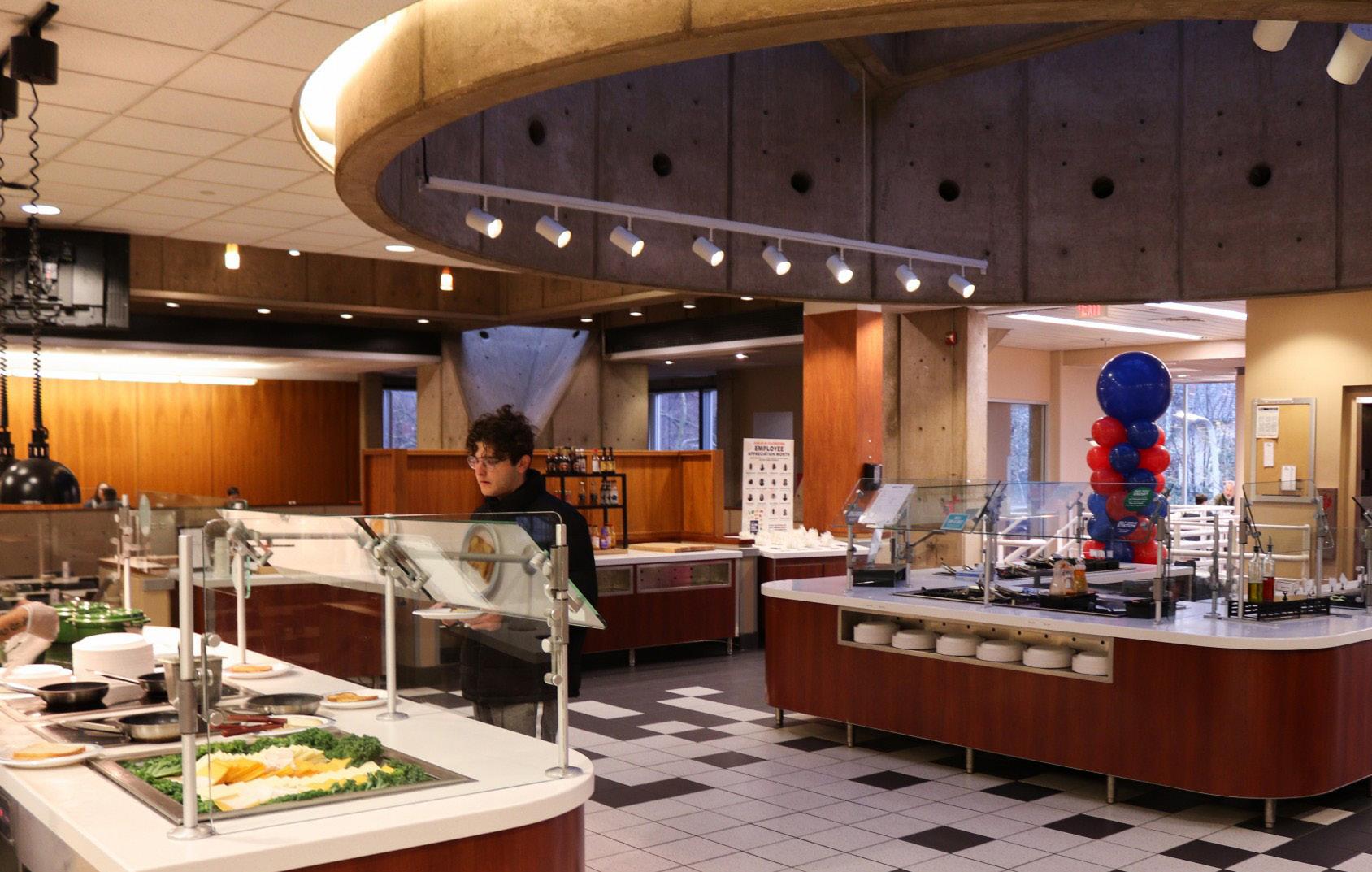
The press release also directed supporters to send a letter via Action Network asking Penn
Idina Menzel announced as 2023 Commencement speaker
“Abbott Elementary” star Quinta Brunson will deliver 2023 Graduate School of Education Commencement speech
JARED MITOVICH Senior Reporter
Actress and singer-songwriter Idina Menzel will deliver Penn’s Commencement speech at the Class of 2023 graduation ceremony.
Penn will award Menzel, a Tony award-winning actress, an honorary Doctor of Arts at the ceremony, according to an announcement from Vice President and University Secretary Medha Narvekar. At the 267th Commencement — which will take place May 15 at Franklin Field — graduates will be granted degrees, honorary degree recipients will be celebrated, and University officials and the commencement speaker will deliver remarks.
Menzel is well known for a variety of performances on the Broadway stage and big screen, including Maureen in the musical “Rent,” the original Elphaba in the musical “Wicked,” and as the voice of Elsa in the Oscar-winning Disney film “Frozen.” In “Frozen,” Menzel sang “Let it Go,” which became a Billboard Top 10 hit and won the Oscar for Best Original Song in 2014. She is the first artist to win a Tony Award for acting and have a song become a Billboard Top 10 hit.
“We are extremely pleased that Idina Menzel will be addressing this year’s graduating class at Commencement,” Penn President Liz Magill wrote in the announcement. “Ms. Menzel has contributed so much to America’s creative body of work and brought joy to us all. A tremendous role model for pursuing your passion with hard work and determination, she is also devoted to creating opportunities for others through the arts. I know it will be a memorable day for our students and their families.”
In addition to Menzel, Emmy-award-winning actress, producer, writer, and comedian Quinta Brunson will deliver the 2023 graduation speech for Penn’s Graduate School of Education.
Brunson, a West Philadelphia native, is best known for creating, executive producing, and starring in ABC’s “Abbott Elementary,” which premiered in 2021. Brunson
Penn to eliminate on-campus graduate student housing

The closure of Sansom Place West comes after Sansom Place East closed in April 2022 for redevelopment into a privately owned apartment building
KATIE BARTLETT Staff Reporter
Penn will become the only Ivy League university to not offer on-campus housing exclusively for graduate students.
In mid-November, Penn Off-Campus Services announced that Sansom Place West — currently the only Penn-owned graduate student housing option — would close at the end of the 2022-2023 academic year, according to Graduate and Professional Student Assembly leaders. The imminent closure of Sansom Place West comes after Sansom Place East closed in April 2022 for redevelopment into a privately-owned apartment building.
In response to a request for comment, Penn Business Services Director of Communications and External Relations Barbara Lea-Kruger directed The Daily Pennsylvanian to the Graduate Housing tab on the Penn Residential Services website. The site offers information about privately owned graduate student housing and rental search services.
Sansom Place West, which is located at 3650 Chestnut St., currently houses a few hundred graduate students, according to GAPSA president Robert Watson. In 2019, Associate Vice Provost for Graduate Education Anita Mastroieni told the DP that about 600 graduate students were living on campus, with around 75 acting as residential advisors in undergraduate college houses.
GAPSA Executive Board members said that they had been told that the closing of Sansom Place West is due to plans for renovation. In February 2021, a $10 million renovation plan for Sansom Place West was approved by the Board of Trustees Budget and Finance Committee. The plan includes upgrades to Sansom Place West’s interior and infrastructure, including aesthetic and fire panel improvements.
GAPSA Executive Board members said that they were informed that the on-campus housing option would be ending at the same time as the public announcement was made. They expressed frustration that the change had not been communicated earlier, alleging that no opportunity was provided for GAPSA to offer input.
See COMMONS, page 2 See SPEAKER , page 8 See GRADUATE, page 8
CONTACT US: 215-422-4640 SEND STORY IDEAS TO NEWSTIP@THEDP.COM ONLINE AT THEDP.COM THE INDEPENDENT STUDENT NEWSPAPER OF THE UNIVERSITY OF PENNSYLVANIA • FOUNDED 1885 PHILADELPHIA, THURSDAY, MARCH 16, 2023 VOL. CXXXIX NO. 9
PHOTO BY ABHIRAM JUVVADI
PHOTO BY ABHIRAM JUVVADI
UNION, from FRONT PAGE


students who are not on financial aid,” Williams said. “We view that as a fundamental inequity, and that needs to change.”
said that he heard RAs and GRAs faced “a lot of disrespect” from the University, such as being told to put themselves in “potentially dangerous situations while the virus was raging.”
Williams said that he hopes Penn will “respect the democratic process and the workers’ rights to form a union.”
“We will be sharing additional information in the coming weeks. We encourage all RAs and GAs to learn as much as you can, so that you are fully informed about all aspects of this very important decision,” Executive Director of College Houses and Academic Services Karu Kozuma wrote in an email to all of the RAs.
Administrators from Penn’s College House & Academic Services did not reply to a request for comment by publication. There are 218 student RA positions available for the 2023-24 school year, according to CHAS.
OPEIU Local 153 organizer Scott Williams, a 2016 graduate of Penn’s Graduate School of Education, told the DP that he believes RAs want to unionize because of the “serious issues” they face as workers.
“Many of these workers receive financial aid in ways that make it so they are essentially doing unpaid work and are receiving less pay than
For FGLI students, Lin-Alves said that the University effectively cancels out their housing refund that is part of their financial aid package with the free housing guaranteed to RAs. Essentially, the refund FGLI students would receive for room and board is eliminated because of their RA position, but “now they have to work for it.”
Financially, Lin-Alves said that the meal plan’s inadequacy is also a key complaint. RAs and GAs receive a partial dining plan, equivalent to about three meals a week, which allows the employees to eat meals with residents on a full meal plan.
Lin-Alves said that the meal plan is not enough, as other universities provide a full dining plan for RAs and GAs.
He added that the plan to formulate a union among RAs and GAs had been coming up in conversation among employees across the College Houses for “a long time,” citing a number of RAs who noticed issues and determined that a union was the “best way” to address them.
During the COVID-19 pandemic, Lin-Alves
Testing the Reward-Drinker Hypothesis of Naltrexone Using an Extended-Release Formulation
University of Pennsylvania
To participate in this study, you must be:

18-65 years old
Express a desire to reduce or stop drinking
Able to complete all study visits and willing to receive 2 injections of study medication over 8 weeks of treatment.
This is a 7 visit study to occur over 12 weeks. This includes an initial screening visit, an 8-week treatment phase (during which time you will receive 2 injections at 4-week intervals of XR-NTX or a placebo), and a follow-up visit 4 weeks after the treatment phase.
Participants may be compensated up to $345 if they are eligible to participate and complete all study visits.
“Coming out of the pandemic — not only as a health crisis but also as a social crisis — the work that RAs are doing is really important in creating this community, so we think that we should have a greater compensation that’s deserving of that work,” Lin-Alves said.
While the pandemic has mostly passed, LinAlves noted that similar situations continue to manifest, adding that other support services within Penn Residential Services “aren’t always as responsive as they should be.”
“Part of the RA system is that we are oncall overnight, [and that responsibility] rotates throughout the different RAs in each House,” Lin-Alves said. “That basically means we are often the first point of contact for any issues that happen. Even though it shouldn’t be our responsibility to continue responding to situations all the time, because we’re the most available, it often is.”
The process of collecting signatures and gathering support for the union was a “grassroots effort,” Lin-Alves said, adding that the approach was mainly conducted through one-on-one conversations with every RA and GA.
Since there is already more than a supermajority of RAs and GAs who support unionization,
Williams added that the next steps include negotiating with Penn and the National Labor Relations Board on finding a date for a formal election — where RAs and GAs vote either ‘yes’ or ‘no’ on unionization — within the next six weeks. According to the email from Kozuma, the elections consist of a simple majority, so even those who choose not to vote will be bound by the results.
Lin-Alves said that he hopes that Penn will be supportive of the employee union, but expects the University to oppose the formation nonetheless. He said that it is the group’s federally protected right for workers to unionize as part of the First Amendment, adding that despite potential opposition from the University, the RAs and GAs are “still strong together” and have a supermajority to form a union.
The announcement comes after RAs at peer universities, including Barnard College, Wesleyan College, and Tufts University, successfully formed labor unions.

“If we are going to improve our working environment and get the compensation that we need, we need to have a stronger voice, and we can get there collectively with a union,” College junior and RA Madeleine Riley wrote in the press release.
COMMONS, from FRONT PAGE
facilities on Feb. 28. In this announcement, Penn Dining said that its facilities have not had repeated violations that went uncorrected or severe violations.
Hill House was also found not in satisfactory compliance with the health code on Feb. 6 and is still due for reinspection.
Penn Dining said it identified issues with plumbing and drainage in the Commons building that needed to be addressed to prevent pests from getting inside while Commons was closed over spring break. Penn Dining said it has worked with a plumbing specialist to flush, clean, and repair the drains.
“Attending to these mechanics will make significant contributions in preventing pests from entering the building,” Penn Dining wrote.
While most of the repairs were completed during spring break, Penn Dining wrote that there may be additional repairs required that entail closing Commons for about one day. In this case, Penn Dining said it would notify patrons of arrangements for meals in other locations on campus.
The renovation study that is being completed this semester will also determine “what food options we could offer,” Berger wrote.
Commons last underwent renovations during the summer of 2012. These changes focused on the lower floors of Commons, including a revamped patio area, relocating Starbucks to the lower level, and the expansion of the retail dining options. The expansion created what is currently known as Gourmet Grocer, which includes grab-and-go options for students.
2 NEWS THURSDAY, MARCH 16, 2023 | THEDP.COM THE DAILY PENNSYLVANIAN
Get a head start on your graduate studies! ACCELERATED BACHELOR'S TO MASTER'S DEGREE PROGRAM INFORMATION SESSION March 23 / 12 - 1 p.m. Gutman College House WWW.GSE.UPENN.EDU/ADMISSIONS/ PENN-UNDERGRADUATES Luxury suburban 1 bedroom apt. for rent. Walk to RR and be at Penn in 20 minutes. 4 rooms (670 sq ft). MB with walk in closet AC, W/D, large deck, fenced in yard and off street parking. $950. No pets. Call 610-453-4124
•
•
This study is being conducted to compare the effects of a medication (extended-release naltrexone or XRNTX) or placebo (an inactive substance) together with brief counseling on reducing or stopping drinking. •
the DP, “Penn greatly appreciates and values our Resident Advisors and Graduate Resident Advisors, who are important student leaders on campus. We are in receipt of the petition that was shared earlier today and are in the process of reviewing it.”
Penn to increase tuition and charges by 4%, raise income limit for financial aid
The eligibility threshold for financial aid packages that fully cover all undergraduate costs will be raised to $75,000 next year.
ELEA CASTIGLIONE AND CAMELLIA BÙI Staff Reporters
Penn announced a 4% rise in the cost of attendance and an increase in the number of students who will be eligible for full financial aid.
At a University Board of Trustees meeting on March 2, administrators announced that undergraduate tuition and charges will total $84,600 for the 2023-2024 academic year, up from this year's $81,340. The 4% increase represents a return to pre-pandemic rates — following a 2.9% increase last year and 2.8% the year prior — and marks the second year that total undergraduate costs exceed $80,000. The tuition rise was announced alongside an additional increase to the undergraduate financial aid budget.
“This increase helps to offset the impact of high levels of inflation, especially for compensation, and is accompanied by an approved undergraduate financial aid budget of $286 million, a 12% increase from 2022-2023 projected financial aid spending," the University wrote in an announcement.
For the 2023-2024 academic year, the eligibility threshold for financial aid packages that fully cover all undergraduate costs will be raised to
$75,000, up from the previous income limit of $65,500. Students whose families make $75,000 or less annually will not have to pay for tuition, fees, housing, and dining. They will also be eligible for grants and work-study funds.
Last year, the financial budget rose by 11.1% to $288 million — the largest financial aid expansion in the past decade. The expansion of eligibility means that approximately 200 previously ineligible students can now receive this type of package, a large addition to the 1,067 students currently benefiting from the program, administrators said at the meeting.
“This expansion of Penn’s undergraduate financial aid program will make the path to Penn possible for hundreds of additional students each year,” Penn President Liz Magill told Penn Today.
The cost of tuition, housing, dining, and student support services for undergraduates will all rise for the 2023-2024 academic year, marking an increase of over $10,000 in costs in the past five years.
The full undergraduate bill includes $58,620 for tuition, up from the previous year's $56,212. University housing will rise from $11,754 to $12,166, and dining will rise from $6,134 to $6,330. Undergraduate fees, which cover the cost of student support services, technology services, and wellness services, will increase from $7,240 to $7,484.
The presentation given to the Board of Trustees cited inflationary pressures, labor market dynamics, tuition growth rate pressures, spikes in utilities costs, and financial market volatility as some of the reasons for the increased costs.
Penn is one of many universities with the largest increase in cost of attendance nationally after the pandemic, the Philadelphia Business Journal reported. Starting in 2020-2021 and through the 2022-2023 academic year, undergraduate fees have been partially used to cover COVID-19 public health measures such as contact tracing and testing.
Approximately 45% of undergraduates currently receive financial aid grants, averaging about $62,000 in funding and covering
LGBT Center announces ALOK as first scholar in residence
Penn’s Scholar in Residence program is the first residency of its kind at any university in the United States
DEDEEPYA GUTHIKONDA Senior Reporter
approximately 73% of the total cost of attendance. Additionally, the proportion of aid funded by Penn's endowment is projected to increase from 21% to 25%. With the new changes, 4,388 undergraduates are forecasted to receive needbased grant aid this year, administrators said.
Pell recipients as a percentage of traditional undergraduates has also increased to a new high of 17.3%, the University reported during the meeting.

Administrators also announced the 2023 fiscal year’s total tuition and fees revenue amounted to $1.733 billion, the majority of which comes from graduate and professional tuition. Traditional undergraduate tuition accounts for $543 million, along with $109 million from room and board, $101 million from the general fee, and $194 million from other fees.
Compared to peer institutions, Penn’s
increase is in line with the growing trend of inflationary costs. The emerging pattern of increases in the cost of attendance among private elite universities is an increase of 4% or more, Forbes reported, including a 3.9% hike at Yale University and a 4.8% hike at Brown University.
Yale’s total undergraduate cost will rise to $83,880 alongside a financial aid increase. Stanford stands out with a 7% increase in undergraduate tuition and charges, which marks the largest among peer universities announced so far.
Stanford undergraduates from families with income threshold below $100,000 will be covered completely under the new program, rising from the $75,000 threshold the previous year. Similarly, Princeton University announced in September that most families with an income of $100,000 or less will receive aid covering tuition, room, and board.
Students protest 76ers stadium proposal in Chinatown outside of Board of Trustees meeting
Community members protested outside the Inn at Penn for over two hours
MOLLY COHEN Senior Reporter
Students for the Preservation of Chinatown protested at the Penn Board of Trustees meeting against the proposed Philadelphia 76ers arena in Chinatown.
Over 50 protestors affiliated with SPOC held a demonstration outside of the Campus Apartments office on March 3. The protest moved to the Inn at Penn — the site of the University's Board of Trustees meeting. Some students entered the Board of Trustees meeting but were asked to leave soon after announcing their demands.
According to a press release, SPOC is demanding that the University remove trustees involved with 76 Devcorp, the private development company behind the 76ers' arena, and David Adelman, and divest from all corporations tied to the proposed development.
Adelman — who also serves as CEO of Campus Apartments, a provider for off-campus housing for Penn students — is the chairman 76 Devcorp that works in partnership with the 76ers' managing partners.
Board of Trustees Chair Scott Bok did not respond to a request for comment.
Last year, 76ers management announced plans to build a new stadium, as the team's lease with Wells Fargo Center — their current home stadium — expires in 2031. The new stadium is one block away from the Chinatown Friendship Gate, the entrance to the Chinatown neighborhood, and its announcement has sparked fear of gentrification by some residents and students.
According to a statement from 76 Devcorp, the arena will not be built in Chinatown, but rather in the Fashion District at Market East. The statement also says that 76 Devcorp is committing $50 million to improve, strengthen and enhance communities around Market East and pursuing solutions to improve commerce, transit, safety, cleanliness and vibrance to the area.
meeting were initially told they could not enter due to a change in policy about allowing students and the room being too full, SPOC co-founder and College sophomore Taryn Flaherty told The Daily Pennsylvanian. According to SPOC's press release, nine Penn students eventually were allowed to enter the Board of Trustees meeting — which is open to attendance from Penn community members — and one student began speaking of the group’s demand as others passed out the demands to the Board of Trustees members.
Hotel management then told the students that police were downstairs and asked them if they wanted to be escorted out, according to the Philadelphia Inquirer. Flaherty said that the protestors then decided to leave the meeting and continue the rally outside with the other protestors.
"Our whole point is that we want the Board of Trustees to hear our concerns," Flaherty said.
Following this incident, protestors remained outside the Inn at Penn for over two hours, and students and community members spoke to the crowd about their experiences with displacement in West Philadelphia and why protecting Chinatown is important to them.
"We as students at Penn, we as residents of the city need to actively be resisting the complicity in the destruction of neighborhoods across Philadelphia and tell Penn to cut off all ties," Flaherty said at the protest.
In addition to the demands involving cutting ties with developers and corporations involved with the construction, SPOC also demanded that Penn end plans to privatize student housing, reevaluate the Wharton curriculum, and openly express support for residents in Chinatown opposing the construction.
Mixed-media artist ALOK was named the inaugural
Penn’s Lesbian Gay Bisexual Transgender Center announced its first-ever scholar in residence following an anonymous $2 million gift to the center.
The Scholar in Residence program is the first residency of its kind at any university in the United States, according to Penn Today. The program — which will launch in April with ALOK — aims to invite prominent LGBTQ leaders to Penn.
ALOK is “an internationally acclaimed author, poet, comedian, and public speaker, whose work explores themes of trauma, belonging, and the human condition,” according to Penn Today. In addition to publishing "Femme in Public," "Beyond the Gender Binary," and "Your Wound/ My Garden," they have toured more than 40 countries over the past decade.
"In the face of escalating malalignment we see a widening chasm between the reality of LGBTQ+ lives and the misrepresentation of our communities in media and society," ALOK told Penn Today. "As LGBTQ+ scholars and artists we must continue to debunk anti-LGBTQ+ misinformation while also harnessing the power of LGBTQ+ storytelling to create a more inclusive and magnificent world. I'm looking forward to connecting with Penn students, faculty, and staff to celebrate the living poetry of our existence in these turbulent times."

ALOK was chosen by a student-driven
advisory board in collaboration with Penn faculty and staff. The scholar program may vary from a short visit from an activist to a scholar teaching semester-long class, according to Penn Today. During their time at Penn, ALOK will guest teach in Penn's undergraduate and graduate programs, share meals with students, and perform.
“I’m really excited to see more South Asian nonbinary academics on campus, especially someone that is unapologetically themselves,” College first year Haydr Dutta, who is part of the LGBT Center’s transgender and nonbinary committee, told The Daily Pennsylvanian. “It is really inspiring to see the work they do and I look forward to welcoming them to Penn. I’m personally looking forward to the workshops they will be doing with students.”
Campus Pride recently named Penn a “Best Of The Best” college and university for LGBTQ students. The LGBT Center recently celebrated its 40th anniversary and is the second-oldest center of its kind in the United States.

“It is important to recognize that the residency will amplify student voices as well,” Erin Cross, the director of the LGBT Center, told Penn Today.
“According to Penn data, LBGTQ+ students comprise one of the largest minoritized campus populations. Now with this wonderful gift, the Scholar in Residence will bring LGBTQ+ experiences into the spotlight."
“As we continue to develop a meaningful plan to ensure the arena project can positively impact Philadelphia and its residents, it is disappointing to see some groups claiming to represent the broader interests of the city irresponsibly spreading misinformation about our proposed plans,” the statement said.
Students trying to enter the Board of Trustees
“Penn and Drexel students have really strong ties with the developers of the arena,” Bryn Mawr College junior and co-founder of SPOC previously told The Daily Pennsylvanian in January. “We thought that we needed to really start pressuring both developers and the students at the schools to reflect on the systemic issues that the institution and the developers are perpetuating.”
SPOC previously held a protest in November on Penn’s campus demanding the halt of the development of the proposed arena.
3 NEWS THURSDAY, MARCH 16, 2023 THEDP.COM | THE DAILY PENNSYLVANIAN
PHOTO BY ANNA VAZHAEPARAMBIL
College first year Eliana Atienza protests the proposed Philadelphia 76ers arena in Chinatown outside the Inn at Penn on March 3, where a Penn Board of Trustees meeting was being held.
PHOTO BY EIVIND HANSEN | CC0 1.0
Scholar in Residence by Penn’s LGBT center.
CHART BY LILIAN LIU
The conversation circling SEPTA is more nuanced than headlines make it appear.
“UPENN ALERT: Report of Gunshots Fired | 4000 block of Market Street. Philadelphia and Penn Police responded to a report of gunshots being fired in the area of 4000 block of Market Street.
BREAKING: A man is dead after being stabbed on the train platform at 8th & Market streets in Center City.”
These headlines only fuel Penn students’ long-held safety concerns over riding SEPTA. When it comes to Philadelphia’s transit system, these thoughts percolate: SEPTA is not the preferred form of transportation. SEPTA is unsafe and dirty. Instead, students prefer to turn what would be their $2.50 fare into what can be a $20 Lyft or Uber ride, all in the name of safety.
Perhaps the age-old “don’t go past 40th Street” toxic belief at Penn also complicates conceptions about safety around particular stations. This disposition makes news about SEPTA even more grim, and suggests that perhaps precarious transit options exist due to a precarious city. In early February, at the cusp of Penn’s bubble, a shooting occurred near the 40th Street station. 8th and Market streets station made headlines this year after a man was stabbed to death on the train platform. These examples of violence are easy to recall and hard to forget. While many Philadelphians and Penn students alike can attest to an uncomfortable experience on public transit, do these fears reflect reality? And can these perceptions look different depending on the person?
One in two women feel unsafe walking
alone at night. Compare this to the one in seven men who report similar sentiments. Women are fundamentally more unsafe in public, and are often recipients of a large range of uncomfortable experiences, from catcalls to violent attacks and more. The confines of a trolley car can only multiply these behaviors and sometimes, for women, the choice of taking public transit isn’t one that is inherently “safe” considering what could potentially happen.
These concerns are warranted. A year and a half ago, the westbound Market-Frankford Line made national headlines after a woman was publicly raped in a SEPTA car. As shocking as the assault itself was how many bystanders that allowed it to occur. For women, the choice to splurge on an Uber can be a matter of life and death.

There exists a public transit paradox then, particularly for women: People want to take public transit, for convenience or to save money or to be eco conscious, but this leads them to ride-sharing apps instead.
Samantha Cueto, a Nursing junior, typifies her experiences riding public transit, citing safety concerns regarding the times she travels. “I would like to take SEPTA [during] normal times,” she said, acknowledging her pattern of traveling at night, rather than during the day, which she alludes is a safer riding experience.
“I’ll go out in the evening for dates. I do take the Septa late at night … [but] never alone.”
‘Never alone’ is an unfortunate reality for many individuals when it comes to ensuring safety on public transit. Cueto also described an incident at a SEPTA platform where she was harassed by a man for money, an incident
that put her in an uncomfortable spot as a woman. Accompanied by a few friends and her boyfriend when it happened, she had offered him a couple of singles, but the man was persistent in having her break the fifty that had slipped out from her wallet. “If my boyfriend wasn’t there, I would have been frightened,” she said. “That’s just what being a girl is like in Philly.”
Sarah Belle Kim, a College sophomore transfer student from New York, views SEPTA a little differently. Back home, she views the New York City subway system as an affordable, fast way to get around the city. Yet, she is cognizant of the Asian-targeted violence on the subway post pandemic, fearing for her older relatives, particularly her grandparents, after noticing a lot of the assaults were towards Asian elders. “It’s just hard hearing about that on the news,” she said.
When questioned about whether or not that has affected her riding habits or behavior on public transit in New York, Kim explained that though she personally hadn’t changed her transit habits, she noticed that her friends made drastic changes in their appearances for a sense of security in train cars. “I have a friend who is Korean American whose mom said she should dye her hair blonde so people on the subway would think that she was white,” she said.
In Philadelphia, Kim echoes Cueto's safety concerns about taking transit alone past dark.
“If I’m with friends, maybe I’ll take [SEPTA] with them, but if I’m alone probably not,” she says. “When it is late at night, I would take an Uber if I’m far away from campus or do Penn Rides.”
Despite all this, however, Kim remains optimistic. Wanting to get to places like Center City quickly and for cheaper prices, she’s trying to take advantage of the metropolitan transit system, even if it means compromising on when she gets to take it. “I would say if you are concerned about safety and you can afford to not take the SEPTA, that’s totally fine. But that’s not an option everybody has,” she says.
If we look at these incidents at face value, it can be very easy to assume that public transit is inherently and extremely dangerous. Yet, we are hesitant to write off public transit altogether.
Penn students and nonnative Philadelphians alike that are cognizant of (mis)conceptions about safety should consider: Do you feel unsafe on public transit, or unsafe in general?
Ultimately, SEPTA isn’t the causal factor for race-based and gender-based violence. Rather, buses, trolleys, and transit cars reveal the invisible social tensions that bind us. SEPTA magnifies the larger social issues we collectively must tackle. Public transportation is just a microcosm of bigger societal issues: violence against Asian Americans, sexual assault against women, the wealth gap, racial biases and hate crimes … the list goes on.
In an age of rapid privatization of public space, the confined walls of a transit car are one of the last public commons so readily accessible. Where else in modern society are you forced to interact with other people, let alone people of differing economic and racial backgrounds? We are offered an affordable ride with the price (and sometimes added benefit) of human interaction.
The public transit dilemma is more complex than we make it out to be. To write off public transportation entirely is misguided and a mistake. Public transit is a microcosm of the many social issues plaguing our society, particularly when and where women and racial minorities feel safe.
From the early days of New Student Orientation, students are taught that inside the confines of 34th to 40th streets — our Penn bubble — you’re safe. Penn’s broken relationship with West Philadelphia shows how students are institutionally predisposed to harbor stigmas about the dangers of this city. While four SEPTA stations slice through our Penn bubble, students are still fundamentally disconnected from our community. Selection and memory biases undoubtedly play a role when we talk about public safety, and it could be beneficial to reflect on why and how you form these judgments the next time you choose to board SEPTA.
FIONA MILLER is a Wharton junior studying Behavioral Economics and Social Impact from Roanoke, V.A. Her email is fimiller@wharton.upenn.edu.
Blinded by privilege: the homelessness prejudice at Penn

ISKRA (THE SPARK) | Penn students must question their biases towards the homeless
I listened closely as one of my peers described traveling back from spring break, apparently quite grateful there were no homeless people to avoid in the train station when she disembarked. I opened my mouth to ask why it mattered but quickly shut it, knowing the boilerplate response I would receive: homeless people are violent and dangerous drug-addicts.
Before I arrived at Penn, I thought I knew what I was getting myself into: a prestigious Ivy League that was insulated, self-contained, and chock-full of children of the rich and powerful. What I neglected to consider was Penn’s situation in Philadelphia, a big city plagued by pollution, crime, and poverty. Even more naively, I ignored how these two forces collide when students amble down Spruce Street, or take the SEPTA into Center City for Sunday brunch.
As soon as I moved in, I heard the run-ofthe-mill complaints about the uncleanliness of the SEPTA and the alarming number of crime alerts. However, my peers disproportionately fixated on what some consider a mere nuisance, and others a pernicious evil: homelessness. Whether it was off-handed comments deriding a man asking for a hot meal, peers crossing the street to avoid a woman with all her belongings piled into a shopping cart, or social media posts expressing deep contempt for these same people, prejudice towards the homeless quickly became evident.
I was honestly surprised at the vehemence with which these opinions were communicated. Having gone to public school in the Baltimore area — a city with similar rates of homelessness to Philadelphia — homelessness was not new to me. Many at my high school struggled with homelessness and one of my closest friends was homeless for much of her secondary education. While my high school peers were not without their own biases, they didn’t approach the level of unfiltered prejudice towards the homeless which I have encountered on this campus. For the most part, my experiences are not shared across the Penn community.
This is a function of the fact that nearly three quarters of Penn students come from the top 20% and likely have not truly experienced vast socioeconomic diversity. And with more students from the top 0.1% than the bottom twenty, students who are most likely to have struggled with homelessness firsthand are woefully underrepresented at Penn.
Thus, on a campus dominated by the financially comfortable to ultra-wealthy, it’s no surprise that Penn students approach homelessness with degrees of ignorance. Many
have little to no experience with poverty, and they are easily susceptible to the popular narratives surrounding homeless people — the same stereotypes which reinforce homelessness in the first place.
The obvious danger in accepting such caricatures prima facie is that in doing so, one neglects the diversity of experience which undergirds homelessness in America. In reality, homelessness occurs for many less visible reasons not necessarily directly connected to inadequate finances, including health issues, escaping violence, lack of housing availability, and generational poverty.
Regardless, this deficit of experience does not excuse the rampant ignorance I’ve witnessed on the part of Penn students towards the people we share University City with. Penn students would also do well to remember that most of us are visitors in this city for four years, while Philadelphia is these people’s home whether they are housed or not. Despite this, many consistently ascribe their monolithic, often ignorant and racialized, conceptions of homelessness to every woman asking for spare change or every man sleeping on a sidewalk grate.
Not only does this conception perpetuate largely untrue stereotypes, it reduces what is inherently a structural problem to an individual failing. The reasons this is dangerous are two-fold.
Firstly, this suggests to governments, both local and national, that they are not responsible for assisting people out of homelessness nor for creating the policies that have enabled homelessness to occur.
Second, generalized stigmas against the homeless have been shown to perpetuate ideas that they are less than human, worthy of disgust and contempt. Such hardline discrimination restricts the homeless’s access to basic necessities like health care, which has even larger implications when considering employment opportunities and the like. Thus, prejudice towards homeless people is a self-fulfilling prophecy which continually reaffirms its validity while exacerbating the phenomenon.
The point of this article is not to plead with you about why homeless people are worthy of basic human respect and dignity — why they are should be obvious. Nor is this an explanation as to why homelessness occurs. For that there is excellent literature by NYU professor Deborah K. Padgett, Atlantic contributor Jerusalem Demsas, and countless others.
Instead, I beg Penn students to reevaluate their stances towards those they have never attempted to understand. As future leaders
who will go on to shape public policy and opinion, it is paramount they confront these harmful prejudices now, before encoding them into our nation’s fabric even more than they already are. Moreover, Penn students should take the time to interrogate why they feel the way they do towards the homeless and in doing so, take a step back and remember the following:
Homeless people do not look or act one way or even have one story. Homeless people are people first and foremost — complex and varied — and by generalizing their presence as an urban problem, this reality is ignored.
By understanding the structural causes of homelessness, as well as the institutional barriers to employment, healthcare, and social services, a more complete picture of homelessness comes into frame. Homelessness is a problem, but homeless people are not, and to conflate the two is to reduce very real people to an abstract issue in need of solving.
If you listen to the pundits, the homeless are lazy, uneducated, violent, and drug-addled — and with no contradictory personal experiences, it’s easy to adopt this view as your own. However, we must be cognizant of when people and groups are being weaponized or leveraged for political ends and why. Especially when the facts are at odds with the rhetoric.
This is clearly a non-exhaustive list, but it can serve as a basis for recentering the
conversation around homelessness at Penn. The immense wealth of our student body means that there is understandably little firsthand experience with homelessness in its varied nature, yet this does not preclude basic empathy. In fact, this wealth actually necessitates more intentional and deliberate reflection since class-status, especially within the Penn bubble, can insulate people from the reality of life just outside campus while allowing prejudices to go unchecked.
When I hear people repeat bigoted opinions about homeless people, I feel angry — not for some abstract idea of homeless people, but for my friend who was homeless by no fault of her own, who is the hardest working person I know, who doesn’t do drugs and abhors violence. Ironically enough, at the beginning of this article I intentionally didn’t list homelessness as a systemic problem plaguing Philadelphia, because the city has the lowest homelessness per capita of all large cities in the United States. While homelessness should be diligently addressed, the disproportionate fixation of Penn students on the homeless speaks to the biases widely held on our campus that must be deconstructed.
VINAY KHOSLA is a College sophomore studying history and political science from Baltimore, M.D. His email is vkhosla@sas.upenn.edu
4 THURSDAY, MARCH 16, 2023 | THEDP.COM THE DAILY PENNSYLVANIAN OPINION The Land on which the office of The Daily Pennsylvanian stands is a part of the homeland and territory of the LenniLenape people, known to the original Indigenous people as “Lenapehoking.” We affirm Indigenous sovereignty and will work to hold The Daily Pennsylvanian and the University of Pennsylvania more accountable to the needs of Native American and Indigenous people. LAND ACKNOWLEDGEMENT JOSEPHINE BUCCINI Deputy Design Editor ESTHER LIM Deputy Design Editor SOPHIA LIU Deputy Design Editor RILEY NEEDHAM Deputy Copy Editor EMILY CHANG Deputy Opinion Editor VINAY KHOSLA Deputy Opinion Editor YOMI ABDI Deputy Opinion Editor WALKER CARNATHAN Deputy Sports Editor BENJAMIN MCAVOY-BICKFORD Opinion Photo Editor SAMANTHA TURNER Sports Photo Editor ABHIRAM JUVVADI News Photo Editor JESSE ZHANG President EMI TUYẾ TNHI TR ẦN Executive Editor IMRAN SIDDIQUI DP Editor-in-Chief LILIAN LIU Design Editor COLLIN WANG Design Editor JARED MITOVICH News Editor MOLLY COHEN News Editor SAYA DESAI Assignments Editor ALLYSON NELSON Copy Editor JULIA FISCHER Copy Editor ANNA VAZHAEPARAMBIL Photo Editor CAROLINE MAGDOLEN Opinion Editor KIRA WANG Social Media Editor CALEB CRAIN Sports Editor ALEXIS GARCIA Sports Editor GEORGE BOTROS Video Editor RIANE LUMER Podcast Editor MATTEO BUSTERNA Diversity & Inclusion Director JOSH TRENCHARD Business Manager GRACE DAI Analytics Director MADISON SMITH Marketing Manager KRISTEN LI Product Manager AKANKSHA TRIPATHY Consulting Manager ZAIN QURESHI Finance Manager 139th Year of Publication Have your own opinion? Send your guest column to letters@thedp.com. Editorials represent the majority view of members of The Daily Pennsylvanian, Inc. Editorial Board, which meets regularly to discuss issues relevant to Penn’s campus. Participants in these meetings are not involved in the reporting of articles on related topics. COLUMN SUBMISSION THIS ISSUE’S TEAM
BOARD Opinion
THIS YEAR’S
microcosm
The politics of public transit JOINT COLUMN | Public transit is a
of our unequal society
PHOTO BY ROGER GE
A SEPTA trolley stops at 36th Street Station on Oct. 7, 2021.
CATHY LI is a College sophomore studying English and design from Brooklyn, N.Y. Her email address is licathy@sas.upenn.edu.
PHOTO BY BENJAMIN MCAVOY BICKFORD
A student walks past a sign showing a map of University City.
International students bring a unique openness to campus culture
walking into any place, regardless of if we know the people there or not. That said, I definitely believe that being far from home and discovering a new country together helps international students create deeper connections to each other much faster than a lot of American students. This usually happens when we talk about our home countries, being homesick, and what we have learned about the new country we're in.
But Penn is not an easy place to be for anyone, regardless of where you are from.
It's a place where everyone is always in a rush to get somewhere. Where every space seems to be designed for you to be productive. Where competition is always in the back of our minds. Where we are always vulnerable to feeling lonely, even when we are surrounded by thousands of people. This makes it more important than ever for students to be able to create genuine, close relationships to each other from the start of their college experience.
the people around you, it just comes naturally. You may share more vulnerable aspects of yourself with others, or take a risk and introduce yourself to someone new, even if you don’t expect to become your friends. You just have to be a little more welcoming.

For the most part, international students seem to be open to meeting new people. And, as students like Edgar and I have realized, we will most likely be the ones that take the first step to start an interaction with someone. We might go up to the people in our classes and befriend them. We might smile at the people we cross paths with everyday, even if we have never met them.
DESIGN BY INSIA HAQUE
People from all over the world come to Penn for a variety of reasons, whether for the quality of education, the job opportunities, or the romanticized idea of the college experience. And for a lot of international students, coming to Penn is also their first experience living in America. Sometimes, it is not at all what they expected.
“Mainly after NSO, it was harder to speak to more people in class and outside of clubs,” College first year and international student Edgar Rodríguez shared when talking about the openness of students on campus after the first few weeks of the semester. Similarly, I found that even though a lot of students are still open to meeting new people after NSO, it felt awkward for a lot of people to just approach others and introduce
themselves.
Just like Edgar, many international students I know have realized that American culture is starkly different from their own soon after getting to Penn.
I did not realize this difference until after my first week at Penn. I was running around all day doing activities for International Student Orientation, which meant that everyone I met would greet me with a hug and a kiss or two on the cheek. When classes started, my American roommate told me that greeting people with hugs and kisses was not a normal thing here.
In general, I can say that the people back in Mexico are usually more welcoming to strangers than the people I have encountered here. For example, we will always say “good morning” or “good afternoon” when
Additionally, creating close relationships at Penn can make the college experience better because it's nice to have people to talk to about the things you’re struggling with. Going through college isn't an easy thing to do, and having people to rely on allows students to have a solid support system. In my first month here, for example, there was a big earthquake in Mexico and telephone lines weren't working. I had no way to contact my family. However, I had friends that I had just met a few weeks before, and they were the ones that helped me through this. They listened to me and consoled me, and they eventually became my family here.
I can confidently say that my friends have made my Penn experience better. These are people that I've known for about six months now, but for some reason I feel like I’ve known them for a lifetime. And although some might be surprised at how close we got so fast, I can say that when you decide to be a little more open to
So, this is an invitation for everyone at Penn to pay a little more attention to the small things international students do that make them seem more welcoming, and learn a thing or two about it. Regardless of where you are on campus or what you are doing, just the fact that you're at Penn is an open invitation to meeting new people. Maybe instead of just nodding your head at someone, you could go up to them and ask how they are doing. Maybe you could give someone a compliment, even if you don’t know them. And maybe then, you could surprise yourself and find a close friend in someone that would’ve otherwise never been anything more than an acquaintance.
Still, this is only the short experience of a Mexican here at Penn. And just as there are people here from all over the world, there are also a million different personalities and perspectives you might encounter when it comes to openness. However, you can always learn something new from everyone you meet.
ZARA TENA is a College first year studying political science from Puebla, Mexico. Her email is zaratena@sas.upenn.edu.
Philadelphia’s needle exchange programs are changing the narrative
CHOUDHRY CHRONICLES | Ending the stigma and embracing the solution
Philadelphia has long been synonymous with the opioid epidemic — the sight of discarded needles littering the streets is all too common. While needles have come to be the face of the problem, is it possible that they can also be the solution?
In efforts to promote modes of harm reduction, needle exchange programs first launched as an illicit street-based operation in response to the alarming rise of HIV and AIDS cases among intravenous drug users. Volunteers would provide sterile needles, alongside other supplies, such as cotton and alcohol wipes, that supported safer injections. Needle exchange programs (NEPs) have since gained institutional support, receiving sanctions and funding from both state and municipal governments.

In recent years, debates over their necessity as a public health measure have been frequent, with many questioning whether these programs are producing more harm than good. However, NEPs have been shown to be an effective public health intervention, and should therefore be implemented in more communities struggling with substance abuse.
In Philadelphia, needle exchange program Prevention Point Philadelphia (PPP) is the oldest NEP in the country. The Kensington-based program, located at the hub of the city’s opioid crisis, initially began as an underground grassroots movement due to the state’s drug paraphernalia laws. These laws, which are still in place, criminalize possession of any equipment used to consume drugs — including needles.
Prevention Point Philadelphia not only provides safe disposal of and access to needles, but also free medical care, HIV/HCV testing, as well as referrals and assistance to drug addiction treatment and recovery.
To better understand NEPs, I spoke with Anooshey Ikhlas, a junior in the College studying neuroscience with a minor in healthcare management and bioethics.
Ikhlas is a co-founder of SHaRC, the Student Harm Reduction Coalition, one of Penn’s newest clubs. SHaRC partners with PPP to provide support for individuals struggling with substance abuse.
Ikhlas shared her thoughts on some of the common misconceptions surrounding NEPs, emphasizing, “It’s one of those things that people will have their
preconceived notions about, but it is something that can definitely change, and is changing.”
Through her work at PPP, Iklhas has seen firsthand how NEPs can benefit communities struggling with substance abuse. She notes that PPP provides not only syringe services, but a sense of community and a temporary escape from the harsh realities of drug use, sharing, “PPP is a safe and warm place to relax, watch TV, and chat with other people who understand their struggles.”
Needle exchange programs such as PPP have shown to reduce the harm associated with drug use, including the spread of blood-borne diseases, particularly HIV and Hep-C. In fact, the effectiveness of exchange programs has been investigated since 1991 by our very own University of Pennsylvania. In a study that recruited 415 intravenous drug users participating in exchange programs, researchers found an evident decline in needle sharing and HIV infections. In fact, over an eight year study following these participants, the Philadelphia Department of Public Health found a 34% decrease in the transmission of new HIV infections within the drug-injecting population.
PPP’s services go beyond harm reduction by providing case management services to increase individuals’ access to healthcare, housing, and other vital resources. This holistic approach is crucial in supporting individuals’ journey towards recovery and reducing the impact of drug use on their lives and community.
While open needles access has undoubtedly played an integral role in reducing harm among drug users, many have criticized PPP, accusing the initiatives of normalizing the administration of drugs. Other concerns include the increased disposal of used needles in public places, such as parks and sidewalks, as well as the general negative impression of exchange programs on youth and community.
Moreover, while programs often receive donations from healthcare and philanthropic organizations, most funding comes from state and federal government agencies. With limited resources, many individuals and groups believe that funding should be directed towards other initiatives, rather than
Pass/fail it, unless you’re in the College

wasted on regressive programs that facilitate drug use. While it is important to address the root causes of substance abuse, the harms associated with drug abuse are an arguably more pressing matter. Consequences of drug abuse not only pose a threat to the individual at hand, but can also have society wide impacts when considering the spread of infectious diseases.
As much as eliminating drug use altogether is a noble goal, it is not necessarily a practical one — at least in the near future. The factors contributing to drug use and the transmission of HIV/AIDS are complex and difficult to address, involving social, economic, and behavioral influences. Through harm reduction strategies, such as needle exchange programs, negative consequences of drug use can and should at least be reduced, even if the
usage itself cannot be stopped.
By failing to advocate for and prioritize the implementation of NEPs, we risk sending the message that individuals struggling with addiction do not deserve recognition or protection. This stance not only perpetuates stigmatization, but also ignores the reality that substance abuse affects people of all backgrounds and demographics. Through adopting a harm reduction approach and supporting such evidence-based programs, we can work towards a more just and compassionate society that prioritizes the health and dignity of all its members.
AKSA CHOUDHRY is a College first year studying health and societies from Elizabeth, N.J. Her email is aksa@sas.upenn.edu.
ISABELLA’S IMPRESSIONS | The College’s education policies should be amended to allow for more pass/fail opportunities
Disciplines. None of the courses that fulfill these requirements may be taken pass/fail.
Engineering students are required to complete six general electives, with at least two courses in the social sciences and two in the humanities. Students are welcome to format their schedules to minimize stress that could stem from these lessSTEM-oriented general education requirements. For example, up to two of the general electives can utilize approved courses in the Technology in Business and Society course list. Such substitutions are not offered in the College. A student could not take business courses that may be useful for their degree as a substitute for any general education courses that are not of interest to them.
Furthermore, the School of Engineering also allows students to pass/fail up to four courses, including those that fulfill the social science and humanities requirements. Courses outside of a student’s area of expertise can then be taken for the purpose of learning without the pressure of a grade.
social science, along with one free elective. While the pass/fail policies are stricter than those for Wharton and Engineering students, Nursing students are still permitted to pass/fail their foreign language requirement, an opportunity not granted to students in the College.
Understandably, each school is permitted to make their own general education requirements that fit the needs of their students. It appears, however, that all other schools besides the College of Arts and Sciences have better acknowledged the strengths and weaknesses of their students. The other schools recognize that general education courses are likely not a student’s primary area of interest and because of that, they may pose a source of academic stress. The College, with the most requirements and the broadest array of majors, has failed to make such accommodations.
The academic umbrella of Penn is expansive. For undergraduates there are four schools — the College of Arts and Sciences, the Wharton School, the School of Engineering and Applied Science, and the School of Nursing.
While students from these schools are free to take classes in the other schools, each school comes with its own unique general education requirements. The requirements put in place for students in the College, however, do not permit them to take courses pass/fail for general education requirements. This is not consistent with the requirements
for other undergraduate schools and unfairly burdens students in the College.
Students in the College face both the most extensive number of general education requirements and the strictest pass/fail policies. College of Arts and Sciences students have 12 requirements: Writing, Foreign Language, Quantitative Data Analysis, Formal Reasoning and Analysis, Cross-Cultural Analysis, Cultural Diversity in the United States, Society, History and Tradition, Arts and Letters, Humanities and Social Sciences, Living World, Physical World, and Natural Science Across
Wharton students’ general education requirements are similar: They include at least one humanities course, one STEM course, one social science course, and three cross-cultural perspectives courses; a writing requirement is included as well. Wharton students are free to pass/fail any general education courses other than those that count towards the cross-cultural perspective requirement.
Nursing students are required to fulfill sector requirements, a writing requirement, and a foreign language requirement for their general education. Their six credits include courses in humanities and
In the College, a student studying Biology would be required to take a history course for a grade, whereas a Mechanical Engineering student in SEAS could take the same course pass/fail. Such inequities must be adjusted for and students in the College should be granted the opportunity to pass/ fail at least some of their general education requirements if they choose. We are all Penn students, and academic inequities between the schools should not be so blatant and a burden to some.
ISABELLA GLASSMAN is a College senior studying philosophy, politics, and economics and Italian studies from Suffern, N.Y. Her email is iglass@sas.upenn.edu.
5 THURSDAY, MARCH 16, 2023 THEDP.COM | THE DAILY PENNSYLVANIAN OPINION
JUST ANOTHER INTERNATIONAL | Penn students can learn how to be more welcoming from international students
PHOTO COURTESY OF ANOOSHEY IKHLAS Members of the Student Harm Reduction Coalition volunteer at Prevention Point Philadelphia, a needle exchange program.
DESIGN BY INSIA HAQUE
In photos: Penn basketb

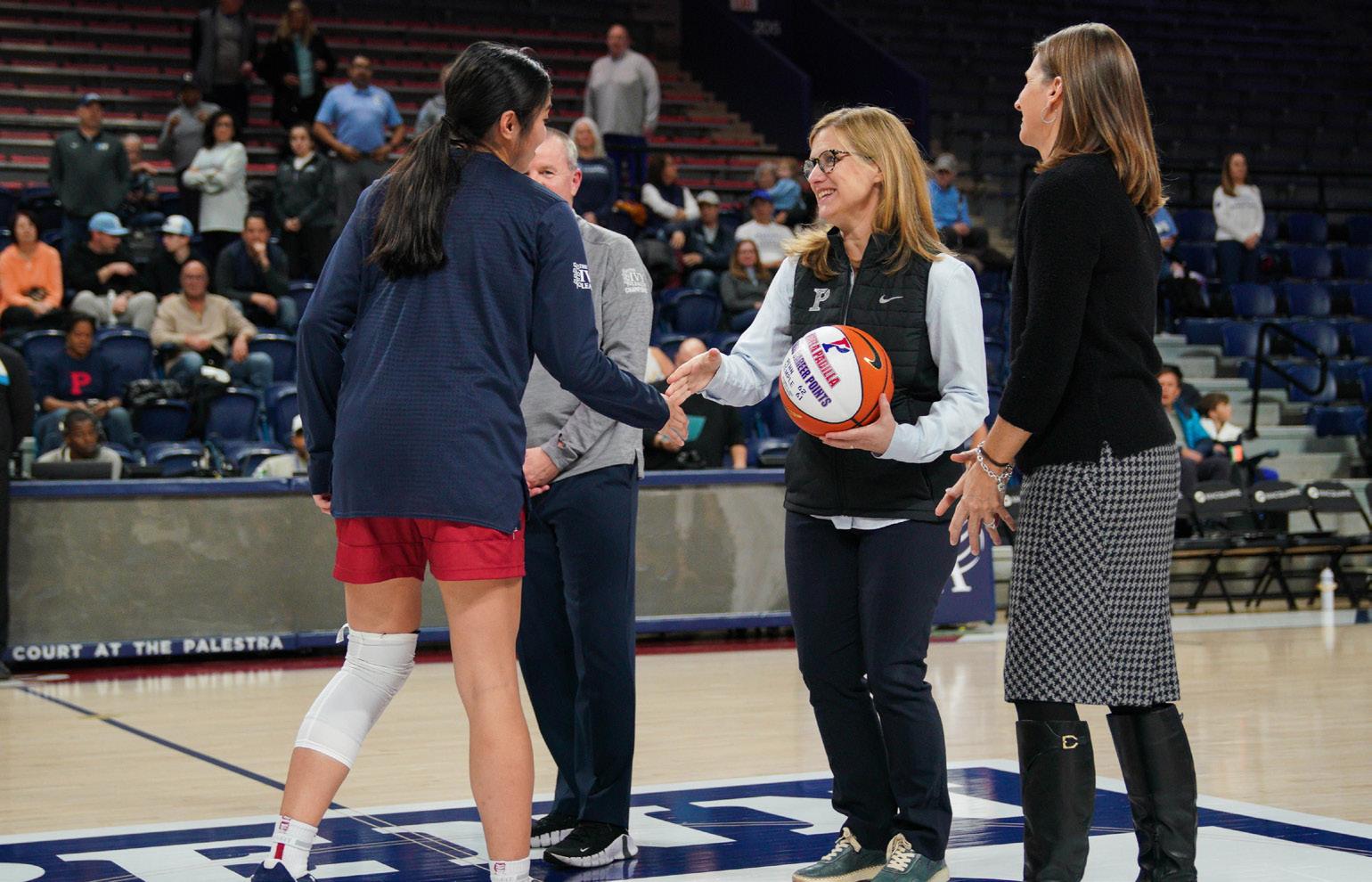
After Penn men's basketball lost its season opener to Iona on Nov. 7, the Gaels' Daniss Jenkins described a goal that Quaker fans would see attempted again and again in the following months.
"You stop Dingle, you neutralize him, that’s the game," he said.
Junior guard Jordan Dingle is a powerhouse on the court, and Penn's opponents honed in on him early into the 2022-23 season. The Quakers suffered a rocky start with consecutive losses against Iona, Missouri, and Towson, which transitioned into a
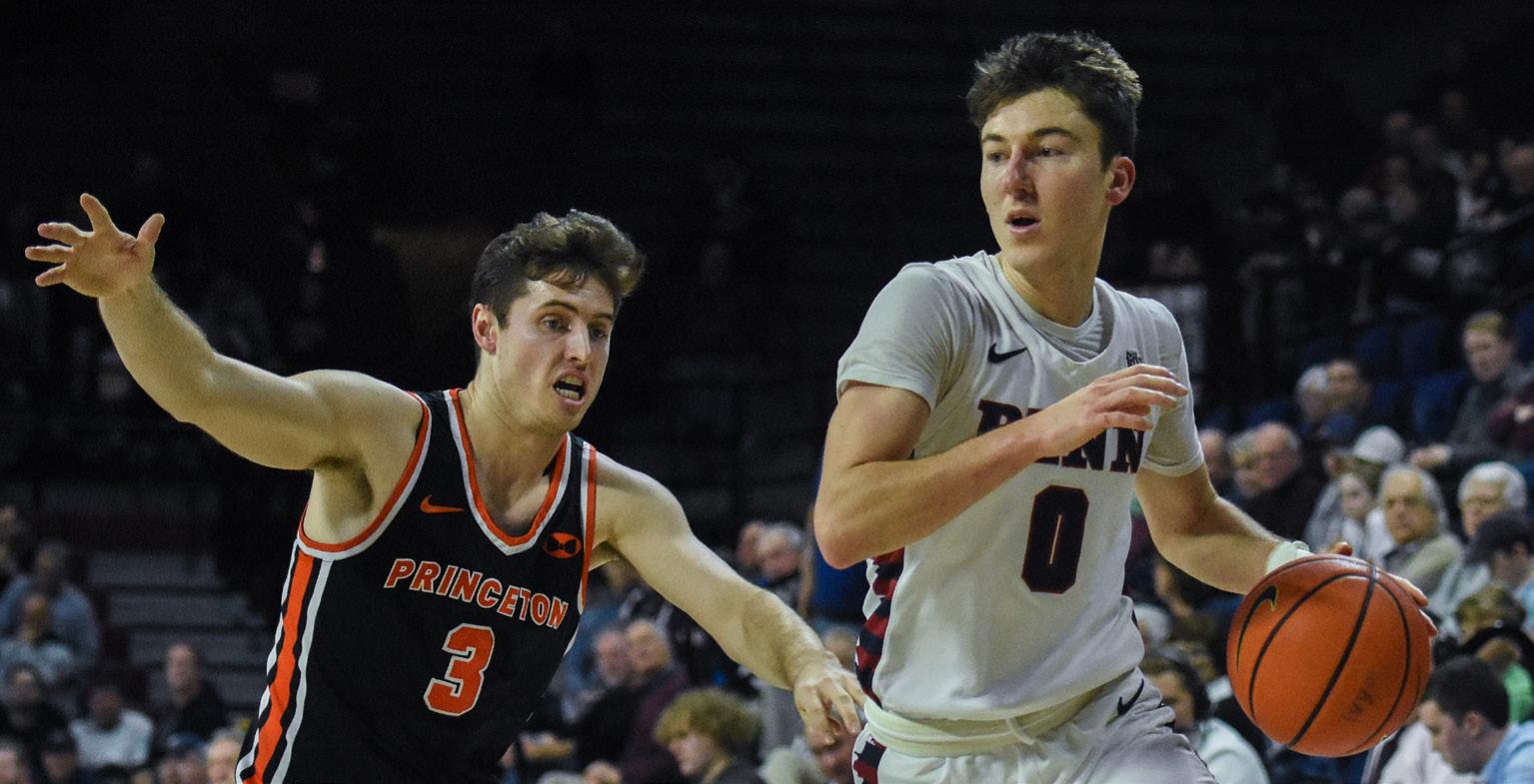
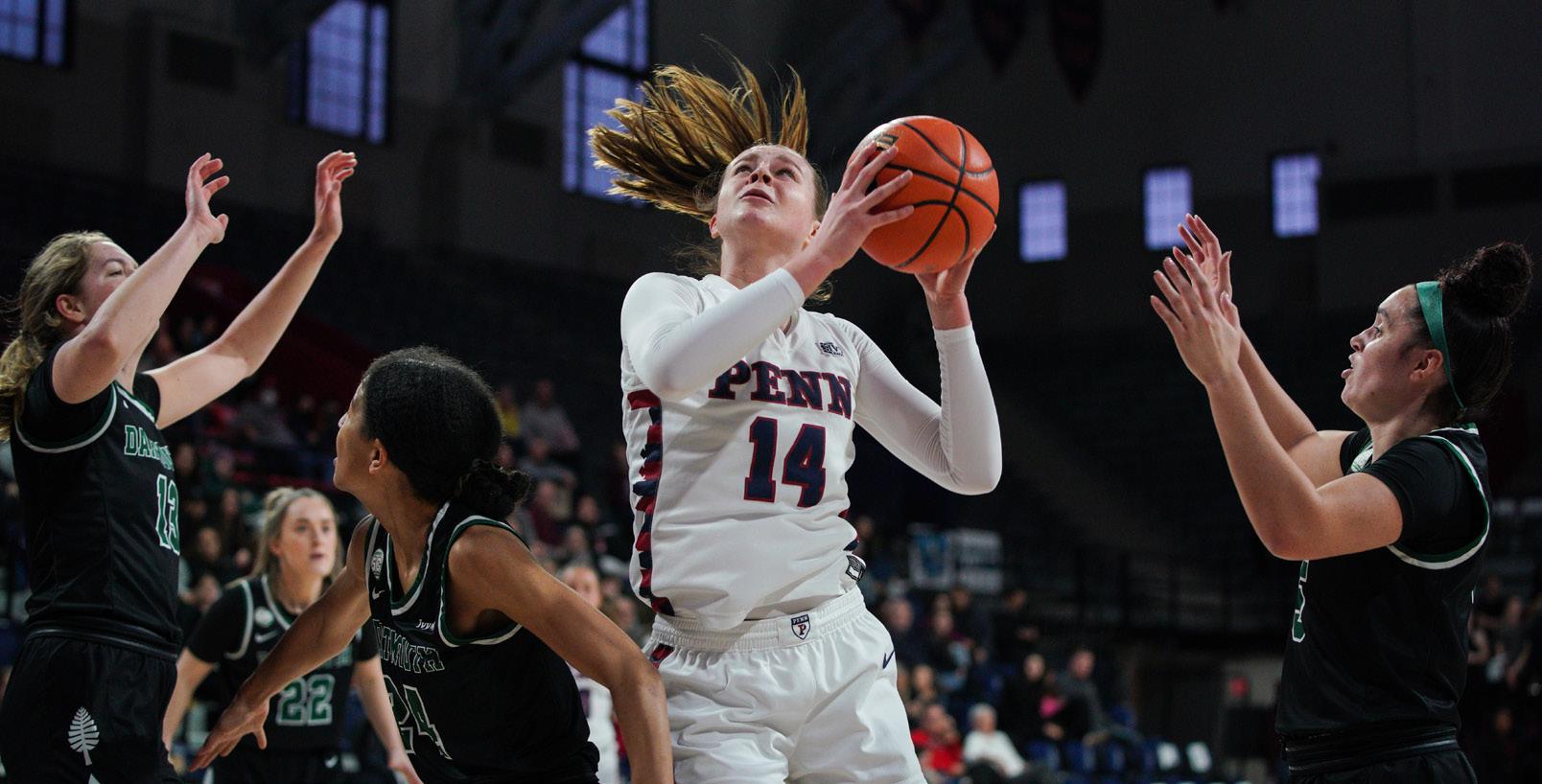
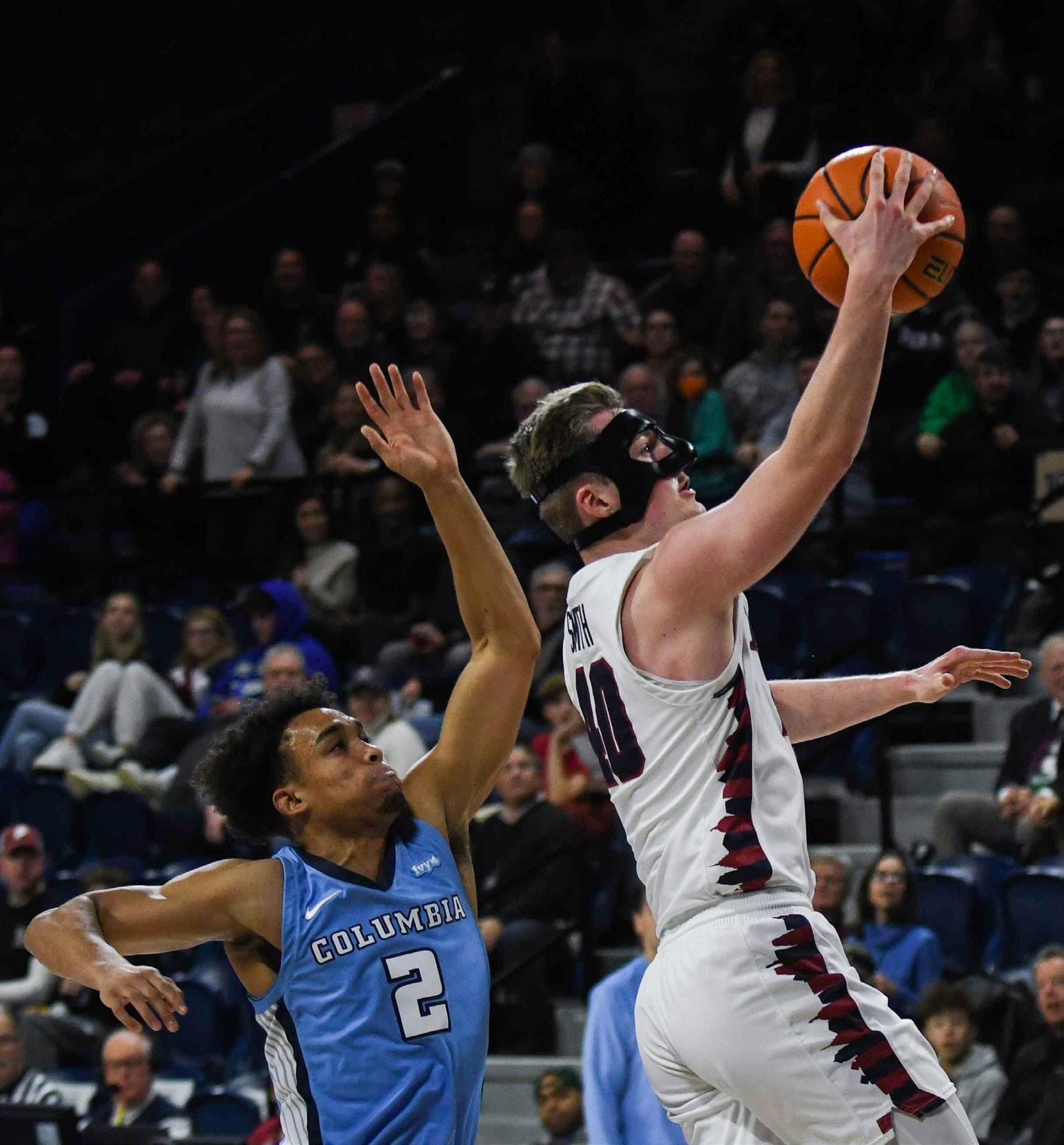
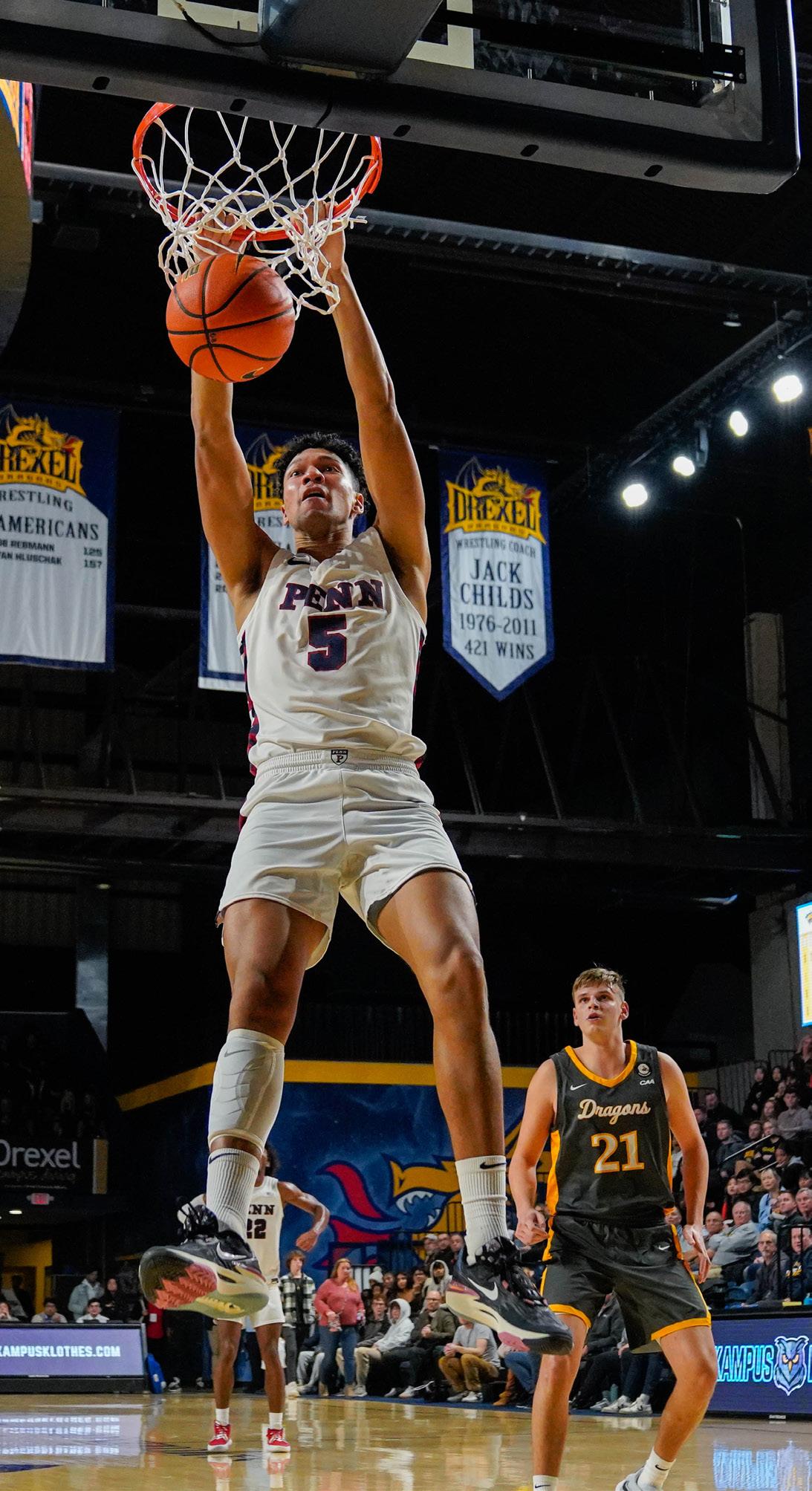
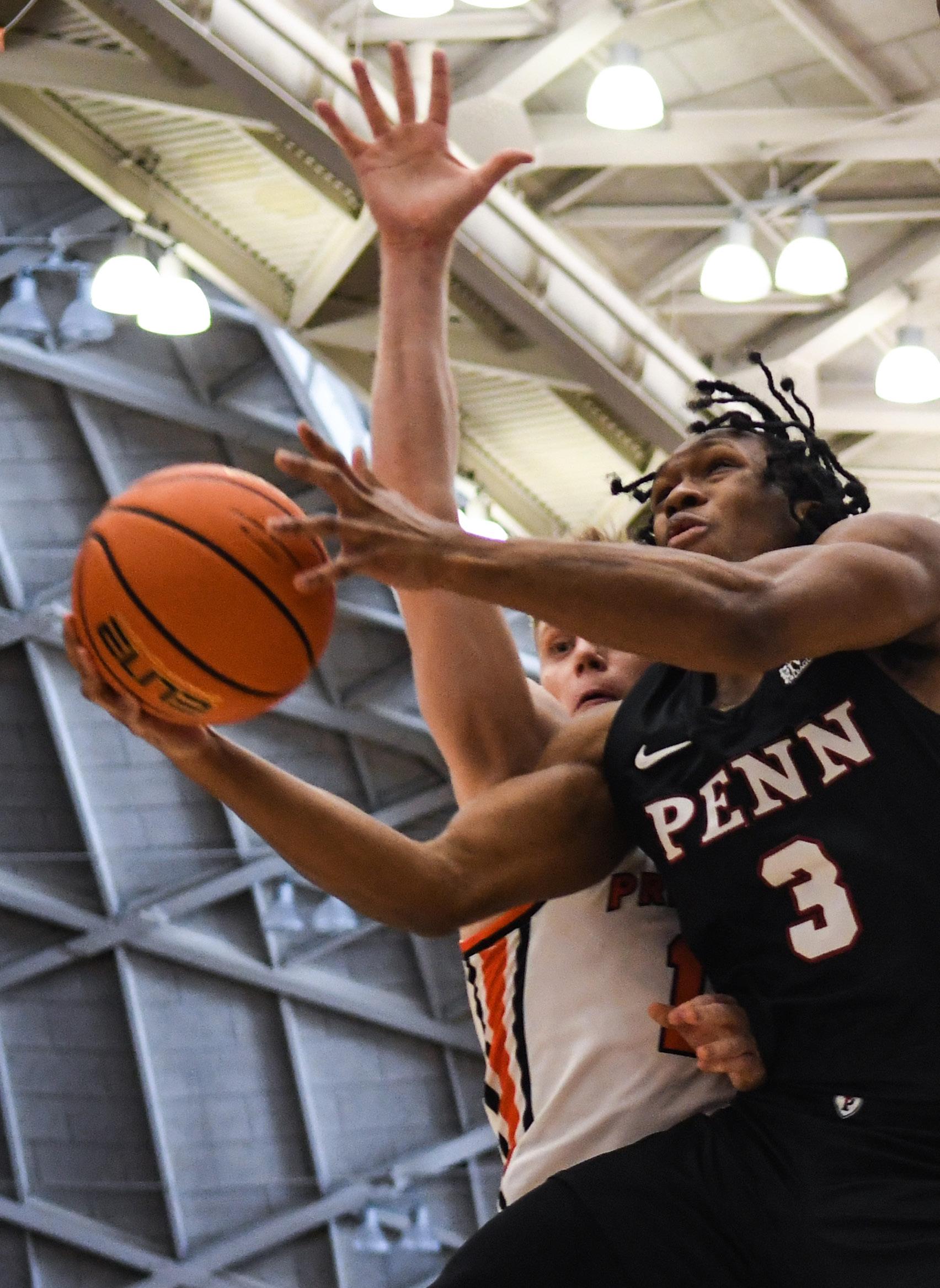
all season 2022-23 3
defeats to Saint Joseph's and La Salle, then a thrilling 77-57 victory over Temple. Despite the pressure of being the focal point of the Quaker offense, Dingle didn't fail to deliver and maintained an impressive scoring average of 24.1 points per game heading into Ivy play.
As the team eventually found its pace, the Red and Blue capitalized on Dingle's momentum to rack up an eight-game win streak. His offensive domination would not have been possible without the support of his teammates on both sides of the ball. Junior guards Clark Slajchert and Max Martz finished the season with a combined 82 threepointers made, enabling Penn to efficiently cover
the floor. Sophomore forward/center Nick Spinoso led the team in assists, senior guard Lucas Monroe tallied 179 rebounds, and senior center Max LorcaLloyd achieved a program-high 34-block this season.
The women's team paralleled a similar versatility on the court this season. Senior guard Kayla Padilla led the Quakers to 11 straight wins, repairing their 1-5 overall record to start the year. In their 62-61 win over Temple, she eclipsed 1,000 career points, becoming the third-fastest Quaker in team history to reach the mark. Just two months later, she broke another school record for career three-point field goals made — notching 208 by the end of the season.


Several other players stepped up as well. Junior forwards Jordan Obi and Floor Toonders led the team in rebounds with 214 and 211, respectively. Toonders also accumulated 31 blocks — second in the Ivy League — and senior guard Mandy McGurk racked up an impressive 48 steals.
However, by the time Ivy Madness rolled around, the team's regular season momentum failed to carry over. Both Quaker squads were handed back-to-back defeats from Princeton, ending their Ivy championship dreams.
Here's how Penn basketball struggled, persevered, and yet ultimately surrendered its 2022-23 seasons, in photos.

ANNA
Photo
THURSDAY, MARCH 16, 2023 THE DAILY PENNSYLVANIAN THEDP.COM THEDP.COM THE DAILY PENNSYLVANIAN 7 SPORTS SPORTS 6
VAZHAEPARAMBIL, ANTONIO MELONI, AND ALEXIS GARCIA
Editor, Sports Reporter, and Sports Editor
PHOTO BY ANNA VAZHAEPARAMBIL
PHOTO BY ANNA VAZHAEPARAMBIL
PHOTO BY ANNA VAZHAEPARAMBIL
PHOTO BY ANNA VAZHAEPARAMBIL
PHOTO BY NATHANIEL SIRLIN
PHOTO BY ANNA VAZHAEPARAMBIL
PHOTO BY SAMANTHA TURNER
PHOTO BY NATHANIEL SIRLIN
PHOTO BY ELLIE PIRTLE
PHOTO BY ANNA VAZHAEPARAMBIL
Junior guard Clark Slajchert fends off Princeton’s Ryan Langborg as he dribbles down the court during the game at the Palestra on Jan. 16.
Penn President Liz Magill congratulates senior guard Kayla Padilla on reaching 1,000 career points during the team's 62-61 win over Temple on Dec. 11, 2022.
Senior center Max Lorca-Lloyd dunks against Drexel during the game at Daskalakis Athletic Center in Philadelphia on Nov. 15.
Junior guard Jordan Dingle puts up a shot against Princeton defenders during the game at Jadwin Gymnasium in Princeton, N.J. on March 4.
Sophomore guard George Smith puts up a layup against Columbia on Feb. 3.
Junior forward Jordan Obi makes a layup against Columbia during the game at the Palestra on Jan. 7.
ups
downs:
undefeated Cathedral Classic record after Thanksgiving preceded disappointing overtime
series of
and
An
Penn's sidelines react to a three-pointer by junior guard Andrew Laczkowski during the second half of the game against Temple at the Palestra on Dec. 10.
Sophomore guard Stina Almqvist puts Penn up by 22 points with a reverse layup against Yale at the Palestra the Palestra on Jan. 21.
Junior forward Floor Toonders puts up a shot against Dartmouth during the game at the Palestra on Jan. 14.
Senior guard Lucas Monroe shoots over a Princeton player during the game at Jadwin Gymnasium on March 4.
portrays the character of Janine Teagues, a Penn alumna and an eager, new-to-the-job second-grade teacher who is optimistic that the school district will provide resources that Abbott Elementary needs.
“Even though we tune in each week for 22 minutes of laughter, Brunson never fails to remind us of the serious consequences of failing to invest in our public schools and the inspiring efforts of teachers across the country,” GSE dean Pam Grossman wrote in the school’s announcement.
At the 2023 Commencement, Brent Staples, Abhijit Banerjee, Esther Duflo, Jocelyn Bell Burnell, and Jean Bennett will receive honorary degrees, according to the University announcement.

Staples, a Pulitzer Prize-winning author and member of the New York Times editorial board, will receive an honorary Doctor of Letters. He won the Pulitzer Prize in editorial writing in 2019 for a series of essays about the history of racism in the United States.

Banerjee is a book author and economics professor at the Massachusetts Institute of Technology, where he co-founded a global research center that is dedicated to amplifying the use of scientific evidence in poverty alleviation policies.
In 2019, he won the Nobel Prize in Economics for his research in development economics. Penn will award Banerjee an honorary Doctor of Laws.
Banerjee co-founded J-PAL with Esther Duflo, an award-winning economics professor at MIT who will receive an honorary Doctor of Laws from Penn. Duflo’s work focuses on issues such as health, education, and financial inclusivity.
With Banerjee, she wrote two books about fighting global poverty and modern economies, called “Poor Economics: A Radical Rethinking of the Way to Fight Global Poverty” and “Good Economics for Hard Times: Better Answers to Our Biggest Problems” respectively.
Bell Burnell, who will receive an honorary Doctor of Sciences, is the chancellor of the University of Dundee in Scotland and a visiting professor of astrophysics at the University of Oxford. She discovered pulsars, which are “considered one of the most important astronomical advances of the 20th century,” according to the University’s announcement.
Bennett, a Perelman School of Medicine professor in ophthalmology, has spent 30 years working on gene therapy for retinal diseases, leading to the first FDA-approved gene therapy for a rare form of visual impairment in humans. In 2021, she co-founded Opus Genetics, which aims to give attention to gene therapies for rare conditions that “have been neglected by the pharmaceutical industry.” Bennett will be awarded an honorary Doctor of Sciences.
“We just want conversations to happen in a transparent, collaborative way and to be in the room when decisions are made that directly affect us,” GAPSA Executive Vice President Hoang Anh Phan said.
Penn previously offered additional graduate student housing in Sansom Place East, another formerly University-owned high rise building located at 3600 Chestnut St. However, that building closed as a result of a $94 million renovation plan that began in April 2022 under a private operator and developer. Now known as The Accolade on Chestnut, the building that was known as Sansom Place East is operated by Greystar and is currently leasing studio, one-bedroom, and two-bedroom graduate student apartments for fall 2023.
Greystar, a company that has faced a lawsuit from renters for allegedly predatory pricing tactics, declined a request for comment.

GAPSA said that the cost per square foot is significantly more expensive at the Accolade in comparison to comparable private apartments. Watson said that the closure will likely have a financial impact on students, forcing them to seek housing from what he said was the more expensive private market, and explore less accessible options farther from campus.


Beyond the financial hardship that GAPSA leadership said this decision will place on students, they said that on-campus housing is essential for social and academic

wellness, because it offers a space for students to find community and connect with each other.
Watson said that advocating for affordable, highquality University-owned housing has been a central GAPSA advocacy point over the past year. Accessible housing has also been a discussion point in meetings with administrators, Watson said.
Specifically, the GAPSA Executive Board members said that they hope the University will offer subsidized housing for graduate students, which is an important part of their efforts toward diversity and inclusion.
“One of GAPSA’s big goals is to support students who might have large financial burdens like health costs and supporting family members or children,” GAPSA Director of Equity and Access Emily Getzen said. “Affordable housing close to campus is an essential part of supporting these students.”
GAPSA members added that they hope Penn will act in accordance with several of its peer institutions that already offer subsidized graduate student housing, including Columbia and MIT. They also pointed out that Penn is currently the only Ivy League school that does not offer family housing. Above all, GAPSA executive board members said that they want the University to better prioritize graduate student needs by allowing them to give input on housing and other issues that impact them.
“We contribute so much intellectually to the University and play so many different roles, from research to mentoring undergraduate students,” Phan said. “It should be a part of Penn’s mission to listen to us and support our basic needs.”
THE NEW GEOPOLITICS OF ENERGY










HOW THE DRIVE TO COMBAT CLIMATE CHANGE IS TRANSFORMING GLOBAL POLITICS

The Russian invasion of Ukraine brought the issue of energy security to the top of the global agenda, placing it on par with international concern about climate change. As countries, businesses, and individuals increase their efforts to move away from carbon-intensive energy, their actions will increasingly change how counties interact with one another, affect prospects for war and peace, and influence the pace of globalization.
In this talk, Professor Meghan O’Sullivan will explain how the drive to address climate change will be one of the biggest geopolitical forces of the coming decade.
Questions?





Contact Anne Kalbach, akalbach@sas.upenn.edu


Thursday, March 16, 2023 • Noon – 1 p.m. Café 58, Irvine Auditorium • 3401 Spruce Street








Criminal Justice Reform Guided by Evidence
Meghan L. O’Sullivan


Featuring MONDAY MARCH 27 5 P.M. HALL OF FLAGS HOUSTON HALL
What criminal justice reforms should we adopt? In this talk, MacDonald discusses the need for reforms to be guided by evidence of effective social programs that are consistent with the basic facts of crime and guard against the tail risk of surges in serious crime and violence. He will review evidence showing that programs focused on increasing informal and formal social control in families, schools, communities, and by the criminal justice system are effective at preventing serious crime and make recommendations for their success.
Penn Arts & Sciences’ long-running Knowledge by the Slice lunchtime series offers educational talks led by our insightful faculty experts. Did we mention there’s pizza? So, come for the discussion and have a slice on us.
8 NEWS THURSDAY, MARCH 16, 2023 | THEDP.COM THE DAILY PENNSYLVANIAN
CHRISTOPHER H. BROWNE CENTER FOR INTERNATIONAL POLITICS THE RENA AND ANGELIUS ANSPACH LECTURE
#SMARTSLICE @ PENNSAS
MACDONALD
Sociology 2206 Washington ave, Philadelphia (215) 546-7301 WE DELIVER Studying too hard? Take a break with us. springfield distributor beer springfieldbeer.net (215) 546-7301 Corner of 27th and South St. DIRECTIONS: East on Chestnut, right on 23rd, right on Lombard WE DELIVER! Post finals pre game CALLS FOR A We’ve got THE BEER FOR your holiday party! 2206 Washington Ave, Philadelphia | (215) 546-7301 Get beer delivered for ST. PAT’S DAY PARTIES Large houses available for groups of any size. Call today to schedule a tour. 215.222.0222 www.apartmentsatpenn.com
JOHN
Professor of Criminology and
PETFRIENDLY!
SPEAKER, from FRONT PAGE
GRADUATE, from FRONT PAGE
Cotogna Sports Group, an investment group founded by six Wharton MBA students, recently purchased the professional Italian basketball team Pallacanestro Trieste.

Prab Sekhon, Fitzann Reid, Richard Johnson, Richard de Meo, John Jefferies, and Connor Barwin are all second-year students in the Wharton MBA Program for Executives. They founded CSG in 2022 to invest in sports franchises. The purchase of the Italian basketball team marks CSG's first acquisition.

CSG brings together students with diverse skills and experiences, including lawyers, doctors, and former professional athletes.
De Meo, the founder and CEO of London-based financial service firm Foenix Partners, said that none of the members knew each other before starting at Wharton.
“The courses gave us common ground and established a shared interest,” de Meo told The



Daily Pennsylvanian. He also added that the Wharton MBA Program for Executives, a two-year curriculum designed for professionals who are already working fulltime, empowers students to build momentum for projects.
The idea of acquiring a team in Italy began when some of the group members took a sports management course taught by Robert DiGisi. DiGisi noticed their interest in sports acquisition and connected them with industry contacts in Italy.
De Meo then traveled to Trieste, the hometown of Pallacanestro Trieste, to speak to the team about a potential deal.
“The power of the alumni network is real,” de Meo said. “It can feel daunting and difficult to know where to start, but there is incredible openness for people to have conversations, to try and support people across the Penn community.”
In addition to DiGisi's support, de Meo stated that Gus Gooney's negotiations course taught him skills that he was able to utilize in discussions with the previous owners of the Italian team.
“We really feel a significant debt to the broader Penn community,” de Meo said.


Sekhon, an energy strategist and CleanTech investor at NextEra Energy Resources, said that the six group members are “intimately involved” in the operations of the basketball team. They are focusing on establishing operational excellence, fiscal discipline, and new revenue streams.

According to Sekhon, CSG is also interested in accumulating sports teams in Europe and North America. The group is currently evaluating the women’s sports market, particularly soccer.
Sekhon credited the successful acquisition to the diverse and complementary skill set of its members.



“Penn brings people with a similar mindset together,” he said. “The biggest value has been the people you meet and the connections you make to build the right team to achieve your goal.”
A new, 250,000-square-foot commercial lab and office space in University City is nearing completion and is now leasing tenants.
University City development firm University Place Associates’ latest development, 3.0 University Place, is a mixed-use commercial property located at 4101 Market St. with thousands of square feet of rentable space. The property includes lab space, office space, and retail space spread across eight floors. The space also features a 14,000-square-foot green roof. The Sheward Partnership served as the architect of the building.
This project is a part of University Place

Associates’ Platinum Corridor vision, which seeks to create a sustainable, pedestrian-based development area from 39th to 42nd streets on Market Street. Fulton Bank will be the first retail tenant of the building, occupying 2,250 square feet on the building’s ground floor, according to a press release sent in an email to The Daily Pennsylvanian. The Wistar Institute, currently located at 3601 Spruce St., previously signed a lease in 2020 to occupy 8,000 square feet of space in the building.



The building also includes 25,000 square feet of retail space which developers said they hope to fill with a restaurant, urgent care center, and a cafe. The building is certified LEED and WELL platinum.
The DP sat down with the developers of University Place Associates to speak about their vision for the area and plans for the building.
Partner and President of University Place Associates Anthony Maher said that one of the missions of the building is making way for the intellectual capital and opportunities at Penn to reverberate through West Philadelphia.
“We want this building to be a significant contributor to the community,” founder and CEO of University Place Associates Scott Mazo said, citing how Penn’s research prowess encouraged the development of world-class labs and research spaces housed within the building.
In line with the impact on the community, Maher added that University Place 3.0's sustainability is unique for the area it is located in.
“I think the staples of what University Place Associates will bring to the table will be bestin-class community development, aligned with the best-in-class sustainability development,” Maher said.
9 NEWS THURSDAY, MARCH 16, 2023 THEDP.COM | THE DAILY PENNSYLVANIAN
Complete the grid so each row, column and 3-by-3 box (in bold borders) contains every digit 1 to 9. Skill Level: Create and solve your Sudoku puzzles for FREE. Play Sudoku and win prizes at: prizesudoku.com Source of “Daily Pennsylvanian”. Solution to Previous Puzzle: Check back next week for answers to today’s puzzle! SUDOKUPUZZLE NEWYORKTIMESCROSSWORDPUZZLE ACROSS 1 Like some committees 6 Many a Syrian or Yemeni 10 “Ri-i-i-ight” 14 “Je t’aime” : French :: “___” : Spanish 15 Does some tech work 17 Firm fruit 18 With 66-Across, hint for solving this puzzle 20 “Roll doubles to get out of jail” or “You do not talk about Fight Club” 21 Supreme Egyptian deity 22 Centerpiece of an agenda 24 Actor George of “The Goldbergs” 27 Museum curators’ degs. 28 “Lah-di-___!” 31 Some nightclub performances 33 Sound of impact 36 Vexed 38 Garment patented in 1914 by Mary Phelps Jacob 39 “My alarm didn’t go off,” for one 41 Young musician 42 Mount Olympus 44 Look good 45 One of the Three Magi 47 Insurance giant bailed out in 2008 48 Some turban wearers 49 Hwy. accident respondent 50 Call home 53 Singer with the 2016 #1 hit “Cheap Thrills” 54 Gossip 55 Sticky plant stuff 57 As a unit 61 Takes a whiff 65 Thick Japanese noodle 66 Continuation of 18-Across 69 Cuts short 70 Feature of a helmet, maybe 71 Absorb, as information 72 Water buffalo 73 ___ Midas Wolf (Disney’s “Three Little Pigs” antagonist) 74 Senator Joni of Iowa DOWN 1 Gillette razor name 2 Judge 3 Give birth to 4 Signs of trouble 5 Emend 6 No soft serve 7 Caviar, for example 8 Only human, briefly 9 Wasn’t, then was 10 Actor Elba of “Cats” 11 Engagement ring 12 What is she in France? 13 Abound 16 Went to third, say 19 Story spanning generations 23 Lil ___ (“Old Town Road” rapper) 25 U.S.A., USB or U.S.C. 26 Wild West show rope 28 Word with square or line 29 Crew top 30 Job bank 32 Symbol of sharp wit 33 Does not 34 Official beer sponsor of the 2020 Tokyo Olympics 35 Group thinking 37 Grossglockner, for one 40 CBS forensic drama 42 Object of hatewatching, perhaps 43 Giant storybook 46 Not very much 48 Rod used to make yarn 51 1978 movie musical starring Diana Ross 52 U.N. member until 1991 54 Like a neutron star 56 Not as nasty 57 Part IV 58 Evidence of expiration 59 Cold Asian desert 60 National flower of England 62 Cold Spanish dessert 63 Pelts 64 Lampooned, with “up” 67 Pan Asian 68 Rock hard PUZZLE BY ALEX ROSEN Online subscriptions: Today’s puzzle and more than 7,000 past puzzles, nytimes.com/crosswords ($39.95 a year). Read about and comment on each puzzle: nytimes.com/wordplay. ANSWER TO PREVIOUS PUZZLE LAMB ACL IMBIBE ALOU LEO MAISEL GOATMILK EDGERS SETTO LISA META DOJO ENYA FAJITA FACECARD ASEA WALTON WHO RILL DREAM UFOS CAL GREECE NUDE EMOTIONS OODLES ALPO INRE AJAX PTSD GRAPE ROTINI PLAYOFFS LEANIN REI ORCS OLDGAG YSL SOSO The New York Times Syndication Sales Corporation 620 Eighth Avenue, New York, N.Y. 10018 For Information Call: 1-800-972-3550 For Release Thursday, March 16, 2023 Edited by Will Shortz No. 0209 Crossword 12345 6789 10111213 14 15 16 17 18 19 20 21 22 23 24 2526 27 282930 31 32 333435 36 37 38 3940 41 42 43 44 45 46 47 48 49 5051 52 53 54 55 56 575859 60 61 626364 69 70 71 72 73 74 Check back next week for answers to today’s puzzle! SUBSCRIBE! to our newsletters Wharton MBA students purchase professional basketball team in Italy Second-year students in the Wharton MBA Program for Executives founded CSG to invest in sports franchises RYAN WOLFF Contributing Reporter PHOTO FROM PENN TODAY Six students in the Wharton MBA Program for Executives purchased the professional Italian basketball team Pallacanestro Trieste. New University City lab and office building looks to include restaurant, cafe, and other retail The 250,000-square-foot commercial lab and office space in University City is nearing completion and is now leasing tenants JASPER TAYLOR Senior Reporter RENDERING FROM THE SHEWARD PARTNERSHIP 3.0 University Place is a commercial lab and office space in University City that is now leasing tenants.
Baseball demolishes Villanova 15-5 in home opener
The Quakers scored 10 runs in an explosive sixth inning
ALEXIS GARCIA Sports Editor
Renovated field. New turf. Fresh chalk. A Philadelphia on Philadelphia matchup. The scene was set for Penn baseball’s 2023 homeopener, and the Quakers surely delivered. Following 11 games on the road to open the season, the Quakers (6-6) finally had their chance to play at home on the newly-renovated Tommy Lasorda Field at Meiklejohn Stadium. And Wednesday, the team lived up to the hype, crushing the Villanova Wildcats (1-14) in a 15-5 victory.
Wednesday’s game saw Penn’s offensive momentum take the team to new heights. Senior catcher Jackson Appel went 4-4, freshman infielder Ryan Taylor finished 3-3, and all but one of the starting nine recorded at least one hit.

“We did a lot better [job of] taking pitches which led to more walks,” Appel said. “Those more walks helped us score more runs. Our bats have been getting hot lately — just love to see it, especially in front of all the fans.”
Freshman right-handed pitcher John Cerwinski was on the mound for his first collegiate start. A week prior, he recorded a win after a 2.1 inning appearance against Nicholl State in which he allowed two runs. Cerwinski faced his
fair share of troubles in the first — giving up a single on his first pitch, then a walk. But the rookie then retired the next three Wildcat batters to strand the two runners on base. The second inning wouldn’t go as smoothly though.
Back-to-back grounders scored a pair of runners, putting Villanova up 2-0. The Wildcats jumping out to lead the game first definitely shook the Quakers, who expected the Villanova team — which entered the game collectively hitting .204 — to not be an offensive threat.
But the Quakers wasted no time to respond. A double from Taylor scored a runner, then a scorching single to the right side by senior outfielder Seth Werchan scored another to even the game at two runs apiece. A subsequent walk prompted an early Villanova pitching change — what would be the first of eight.
Following the rocky second inning, Cerwinski really seemed to find his groove. The movement on his pitches had the Wildcats chasing and whiffing after late breaks; he blanked Villanova in the third and fourth.
Coach John Yurkow replaced Cerwinski in the fifth with freshman right-handed pitcher Jake Moss, but the Wildcats were quick to rattle him.
The game had been quiet since the second inning until former Quaker Craig Larson awakened the Wildcat offense with a one-run single. Another Wildcat followed suit, hitting a one-run double to put Villanova up 4-2.
Moss only mustered one out before Yurkow pulled him and replaced him with sophomore left-handed pitcher Marshall Mott. Villanova has the chance to blow the game wide open with bases loaded and only one out. But as seen all season, the Quaker bullpen showcased their exceptional situational pitching to get Penn out of the jam. Now, the Quakers found themselves in the same situation they were in during the second: playing catch up.
Penn did more than even the game, though.
The Red and Blue nearly batted around the order three times in a 10-run sixth inning that included six singles, two doubles, and a triple that forced the appearance of four Villanova pitchers.
“We’re not striking out as much,” Yurkow said. “That was our achilles heel for a while. It’s just important that we put more balls in play on two strikes, and we did a good job of doing that today.”
Sitting at a comfortable seven-run lead, all that was left for Penn was to close it out.
Sophomore right-handed pitcher Tommy Delany did such that. Coming on in relief in the sixth, Delaney threw a shutout frames and struck out all three batters he faced before the Quakers tacked on three more runs in the seventh — forcing a mercy rule finish with a final score of 15-5. Aside from the Quaker bats heating up, Wednesday’s game was also a testament to Penn’s improved pitching performances — especially from Cerwinski and Delany. The Quakers’ pitchers — especially those from the bullpen — have started to trust their stuff more, according to Yurkow. He still hopes to see more of his starting pitchers go the distance before Ivy play roles around.

“Everyone came into this midweek game expecting a win,” Taylor said. “We are still adjusting to the new faces and stuff, but creating a chemistry in the team is definitely going to help us work together better before we get to conference play. Today’s win is great for morale and momentum.”
With momentum from Wednesday’s win and a home crowd cheering the team on, Penn baseball looks to pick up its third series win this weekend as it welcomes UMass for a three-game series.

National Invitation Tournament, Penn’s identity is secured — no matter what, the Quakers never quit. And at their best, they have what it takes to compete with anyone in the Ivy League.
The ideal version of Penn women’s basketball is a team that moves the ball on offense, generates quality looks from beyond the arc, and guards with authority. That is the team they were during the second and third quarters against Princeton and the one they have been during notable stretches of the season.
From their 11-game midseason win streak to their victory over Ivy co-champion Columbia, the Quakers have shown extended flashes of elite play. Even in last weekend’s loss to Princeton, the Quakers led by two at halftime behind 15 points from their bench.
But while those stretches had the look of a potential Ivy League champion, inconsistency ultimately doomed Penn’s title hopes. There were too many disastrous quarters, like the first against Princeton, that resulted in deficits the Quakers could not overcome, regardless of how hard they fought.
Those quarters were most common against the teams that topped the conference: Princeton and Columbia. In Penn’s first game against the Tigers, which Penn entered with a 4-0 record in the Ivy, the Quakers’ offense was shut down in the second quarter, managing just seven points.
In Penn’s second game against Columbia, the Lions outscored the Quakers by 17 in the first half, making a valiant second half insignificant. And after that stellar first-half effort against Princeton in the regular season finale, the Tigers buried Penn with a crushing 27-7 third quarter.
The common theme among those catastrophic sequences was Penn deviating from the offense that served them so well. Their ball movement dried up, with a few players accounting for a bulk of the shot attempts. And in a game defined by makes and misses, the Quakers were unable to connect on shots both open and contested.
If those few periods of play had gone differently, Penn’s season may have followed. But no amount of resilience could have accounted for this team’s inability to maintain their best selves over the course of the entire season. And those times when the Quakers fulfilled their potential, those possessions, and those minutes in which they were on par with the crop of the Ivy League, serve only as a reminder of the team that could have been.
capitalizing on long stretches of sluggish offense from Penn, to tie the game just before the end of regulation. And in overtime, the Quakers simply collapsed, only scoring three points and ultimately losing 77-69.
Princeton lifted a trophy on its home court. But Penn was still headed for the Ivy League Tournament. And once the day’s games were finished and the seeding picture came into focus, Penn would have one last chance at redemption against their black-and-orange-striped foes from New Jersey.
Sure, it was just the semifinal, and whoever won would still have to play Yale to earn the automatic bid to March Madness. But who cares? The Miracle on Ice was also in a semifinal, but almost no one cares that the U.S. still had to beat Finland to take home gold; all that matters is that we beat the Soviet Union for the first time in 20 years.
Such was the setup for Saturday’s game in the Ivy League Tournament Semifinal. And the game didn’t disappoint. It was a tight, hard-fought, backand-forth affair that had the 4,500 in attendance on the edge of their seats. Each team’s stars shone brightest in the tough moments, with Dingle scoring 19 while dishing out six assists, while junior guard Clark Slajchert and sophomore guard George Smith combining to go 6-10 from long range.
But in the end, you can run from it, you can dread it, but you can’t escape it: Penn lost to Princeton, 77-70, its ninth straight defeat to the Tigers and arguably the one with the most on the line.
Such performances in the last two games of Penn’s season naturally lead to a question of who’s
to blame. Is it coach Steve Donahue, who hasn’t defeated the Tigers outside of that 2018 season? Is it the players? Is it a centuries-old curse lost to history which chose the past 15 years to rear its ugly head?
I’d prefer not to focus on those discussions, and instead remember the season that was. The Quakers had great stretches this year, including a seven-game Ivy win streak. But the team also had disappointing patches, including a 2-4 start to Ivy play, a 1-3 record against Big 5 rivals, and of course, three losses to Princeton.
The program will graduate four seniors, including one — guard Lucas Monroe — who started on Saturday. Each of the other three — guard Jonah Charles, forward Michael Moshkovitz, and center Max Lorca-Lloyd — were significant contributors during their Quaker careers, and all four will be missed dearly. But they will leave the Red and Blue without an Ivy title on their resumes.
I also want to take a way-too-early look ahead to next year. Penn will return four of Saturday’s starters, and junior guard Andrew Laczkowski seems like a frontrunner to absorb many of Monroe’s minutes. The starting backcourt of Clark Slajchert and Dingle will both be around for one last ride. There are promising young players who should see more action, as well as a class of recruits, including former Sixers coach Brett Brown’s son, Sam. Princeton will also be losing some of their best players, too, including Tosan Evbuomwan, who won Ivy League men’s Player of the Year just a season ago. This should hopefully give Penn a chance to catch up.
With all this, the stage should be set for the Ivy League to run through the Palestra next year. But of course, that was supposed to happen this year, too. And if it doesn’t, and if Penn still cannot beat Princeton, then it’s time to start having serious conversations about the future of the program.
10 THURSDAY, MARCH 16, 2023 | THEDP.COM THE DAILY PENNSYLVANIAN SPORTS
MBB, from BACK PAGE
WBB from BACK PAGE
PHOTO BY ANNA VAZHAEPARAMBIL
Freshman infielder Jarrett Pokrovsky steps up to bat against Villanova on March 15.
PHOTO BY ANNA VAZHAEPARAMBIL
Penn’s dugout reacts to a successful play in the outfield against Villanova on March 15.
PHOTO BY ANNA VAZHAEPARAMBIL
Freshman right-handed pitcher John Cerwinski pitches on March 15 for his first collegiate start.
Previewing Penn at the NCAA swimming and diving championships
Anna Kalandadze will compete at the women’s meet, while Matt Fallon is out due to injury
GRIFFIN BOND






























 Sports Associate
Sports Associate



















As fans of Penn swimming and diving scanned the names of those invited to the 2023 NCAA Division I Men’s swimming and diving championship in Minneapolis next week, they might have been surprised by one name missing from the list.




The Daily Pennsylvanian has learned that Matt Fallon, a first-team All-American and Ivy League Championship record holder in the 200-yard breaststroke, will reportedly miss this year's event due to an undisclosed injury. In his freshman season, Fallon turned heads — finishing third in the 200 breast at the NCAA
championships. Now in his sophomore season, he currently holds the fourth-best time in the country for the event.
There was high anticipation for Fallon, who just this summer posted the seventh fastest time in U.S. history for the 200 breast. In January, he won seven straight events and earlier in the year, posted an NCAA A-cut time for the 200 breast, meaning he would automatically qualify for the NCAA Championships.

Fallon’s third place finish in the 200 breast at the Ivy League Championships raised some eyebrows after a stretch of such consistent


dominance. His time was over three seconds slower than his season best from November, although it is worth noting that the Ivy Championships were nearly a month before the NCAA championships. Despite Fallon’s absence, Penn will still be sending senior Anna Kalandadze to Knoxville, Tenn. for the NCAA Division I women’s swimming and diving championships from March 15-18.
Kalandadze qualified for both the 1650-yard and 500-yard freestyle. She will be looking to cap off her already impressive season that


includes two individual Ivy titles in both events and a program record in the 1650 free. From last year's NCAA championships, Kalandadze has shaved off nearly 40 seconds from her time in the 1650 free and over eight seconds from the 500 free. Her 15:53.88 finish in the 1650 free is currently sixth fastest in the nation. In Knoxville, Kalandadze will try to defend Penn’s national title in the 500 free won last year by Lia Thomas.
Despite no one traveling to Minneapolis to represent the men's squad, Kalandadze keeps Penn's hopes of a NCAA championship title alive.
11 THURSDAY, MARCH 16, 2023 THEDP.COM | THE DAILY PENNSYLVANIAN SPORTS OPEN LATE & LATE NITE DELIVERY Domino’sTM SUN-THURS: 10AM - 2AM • FRI & SAT 10AM - 3AM LOOKING FOR FULL OR PART TIME WORK? WE’RE HIRING! jobs.dominos.com 215-662-1400 4438 Chestnut St. 215-557-0940 401 N. 21st St. WE MAKE ORDERING EASY! Smart Phones CALL DIRECT OR CHOOSE YOUR ONLINE OR MOBILE DEVICE Tablets
PHOTO BY SAMANTHA TURNER
Sophomore Matthew Fallon competes in the men’s 1650-yard freestyle during a meet against Rider University at Sheerr pool on Jan 27.
IVY SADNESS
Regarding rivalry, ownership, and Penn men’s basketball
Crain | With another disappointing season in the books, it’s clear that Penn’s Tiger troubles are going nowhere
CALEB CRAIN
Sports Editor
“This is not a rivalry. They always kick our ass.”
Those were the words of Philadelphia’s most prominent basketball player — 76ers center Joel Embiid — in 2018. He said them about the Boston Celtics, but it could just as easily be true about Penn men’s basketball and its relationship with That Team Up North: Princeton.
The Quakers have lost nine straight to the Tigers, and outside of a magical run in the 2017-18 season, haven’t had sustained success against Princeton since George W. Bush was president. The losses have been tight, lopsided, and everything in between, but Penn simply has not been able to shake its nemesis to the north.
Rivalry games should be played on the biggest stages, when the most is at stake at the end of the season. This year, the Penn-Princeton rivalry
Despite Ivy Madness loss, women’s basketball’s identity is secure
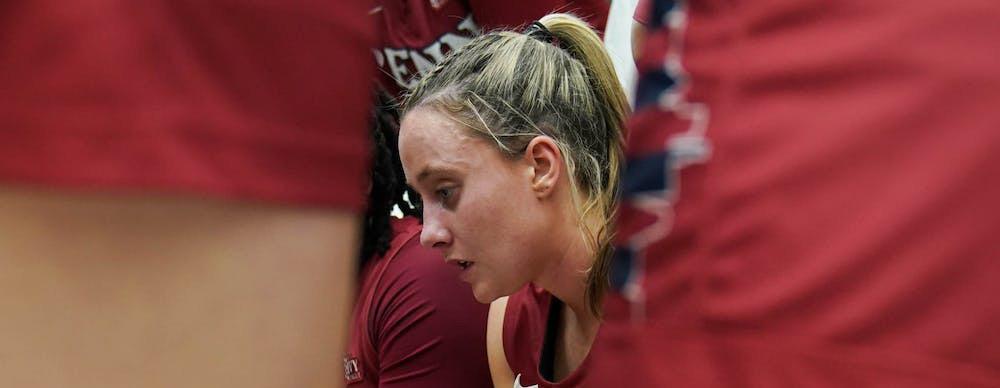
Carnathan | After being outscored 19-2 in the first quarter, Penn battled back, displaying both their resilience and inconsistency
WALKER CARNATHAN Deputy Sports Editor
embodied that, and the stage was set for the Quakers to finally slay their Tiger demons.
Last week, Penn came into Jadwin Gymnasium with a share of the Ivy League title on the line. What ensued was one of the best halves of basketball the team has played all season long. With 20 minutes to go in the regular season, Penn led by 17, was shooting over 50% from the field, and out-rebounding the Tigers — who were No. 14 nationally in rebounding margin during the season — 22 to 15. Junior guard Jordan Dingle was electric, with 21 points, and junior forward Max Martz hit two long-range shots.
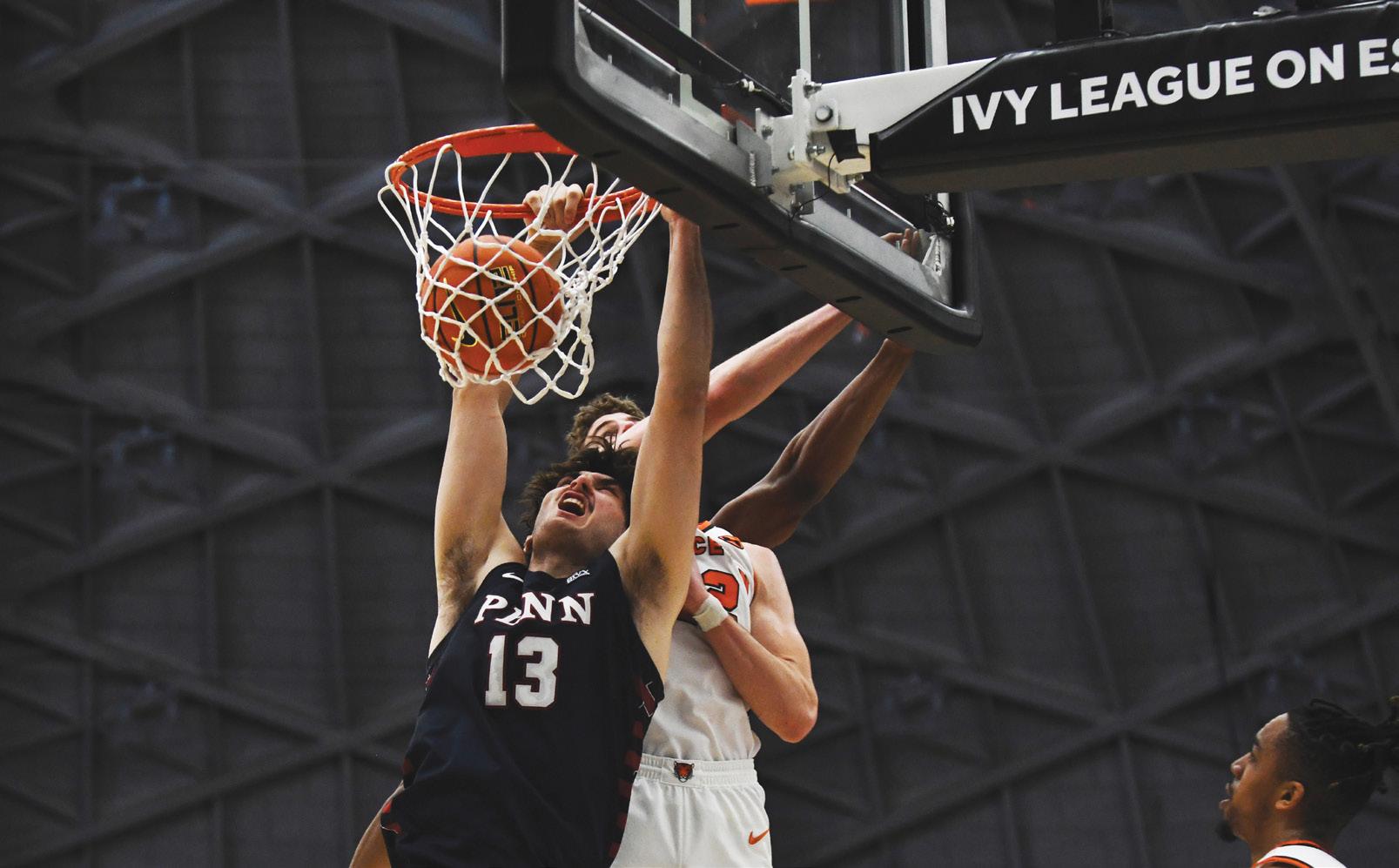
But what followed after the break was nothing short of pathetic. Princeton came all the way back,
See MBB, page 10
It would have been easy for Penn women’s basketball to quit.
After being down 19-2 after the first quarter of the Ivy League semifinal against Princeton, no one would have blamed the third-seeded Quakers for backing down. For going away. For accepting defeat against a Tigers team that had already beaten them twice this season, and whose defense had overwhelmed them since the opening tip.
But that has never been who the Quakers are.
Instead of giving in, Penn fought back, slowly but surely clawing their way back into the game. A renewed tenacity on defense opened the door, and the Quakers supplemented that effort with offensive execution that threetime All-Ivy senior guard Kayla Padilla called
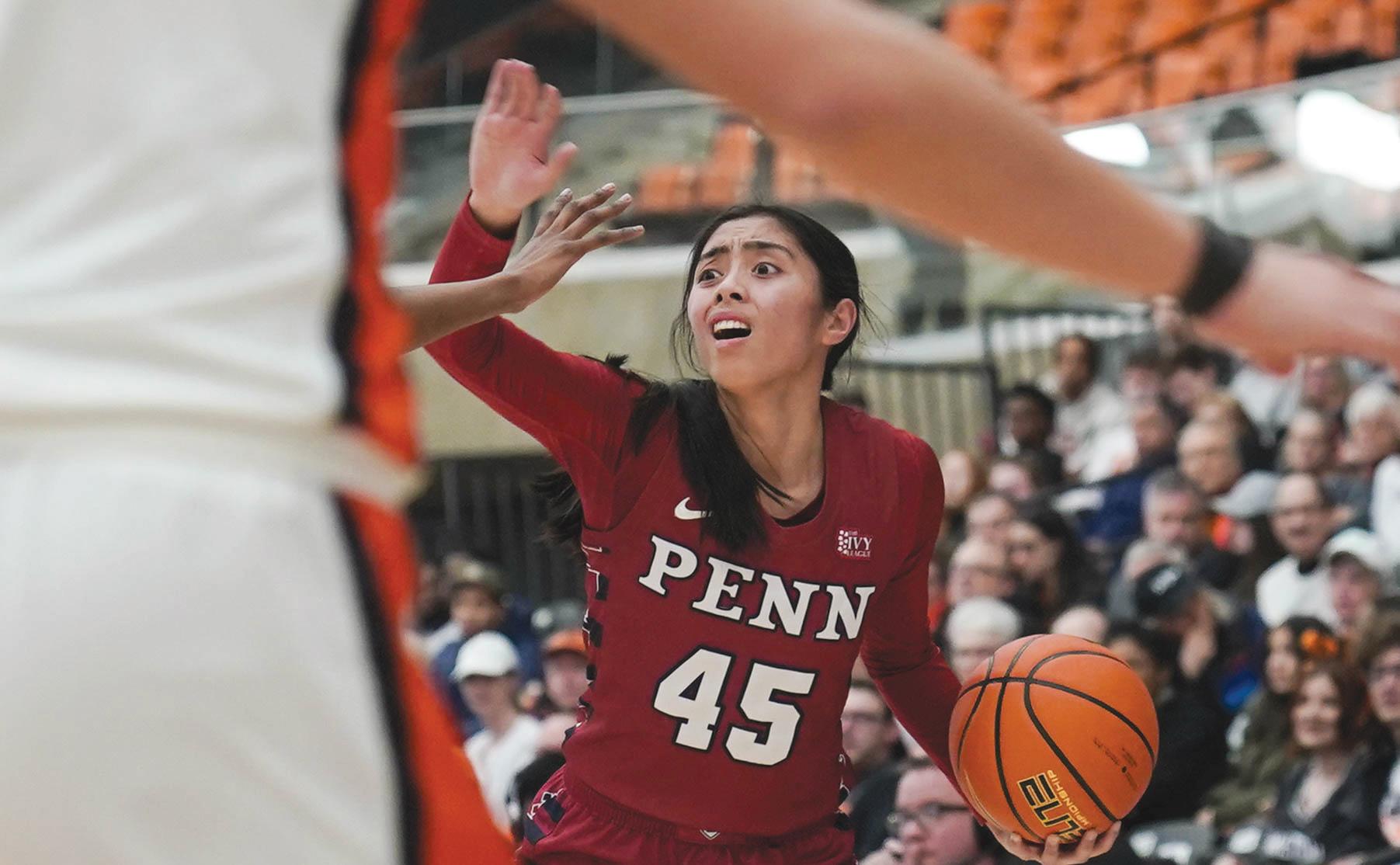
Previewing Penn at NCAA Wrestling Championships
The Quakers will field eight wrestlers at this year’s event, which will be held in Tulsa, Okla.
VIVIAN YAO Sports Associate
As the 19th ranked team in the nation, Penn wrestling will head to Tulsa, Okla. this weekend for the 2023 NCAA Division I Championships. After what has been a rather successful season, Penn will field eight wrestlers — the most out of
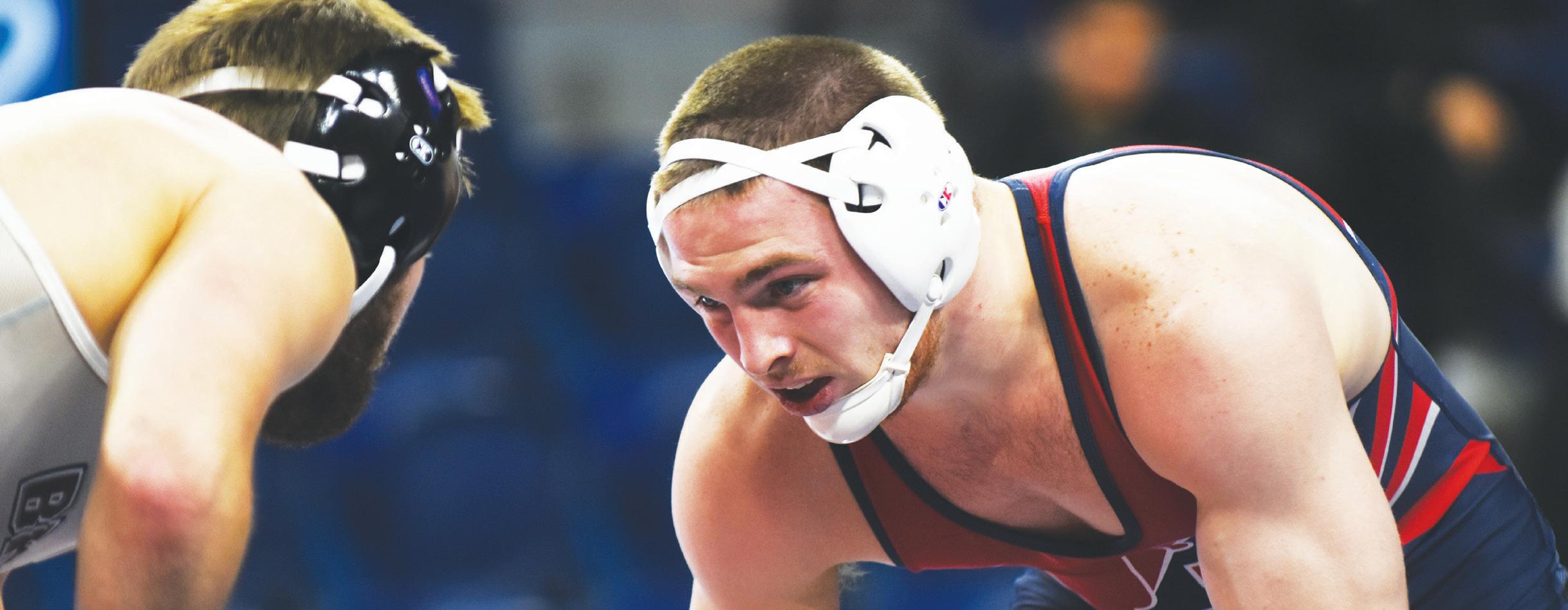
all Ivy League and Eastern Intercollegiate Wrestling Association teams. Of those eight wrestlers, five secured their automatic bids during the 119th EIWA Championships, which took place last weekend at the
Palestra. As a team, Penn finished third with five wrestlers placing in the top three for their weight class. Most recently, eight members of the wrestling team were honored with All-Ivy accolades. Of those eight, seven of the them will be
“some of the best we played all season.”
Though Penn’s resurgence ultimately fell short in the fourth quarter, resulting in a 60-47 defeat, the caliber of play the Quakers demonstrated in their comeback, as well as the resilience required to mount it, say a great deal about the type of team Penn truly is.
“This team really played their hearts out,” coach Mike McLaughlin said following Friday’s loss. “Obviously, it was a really difficult start … a lot of teams would have just stopped, and this group has never done that.”
Penn finished the regular season at 17-11 with a 9-5 clip in the Ivy League. Though they are still in contention for a bid in the Women’s
See WBB, page 10
competing at the championships this upcoming weekend.
The five wrestlers who locked down automatic bids include senior Anthony Artalona, senior Ben Goldin, senior Carmen Ferrante, junior Michael Colaiocco, and sophomore Ryan Miller. Three more wrestlers — senior Doug Zapf, junior Cole Urbas, and sophomore Nick Incontrera — will also be traveling west after earning at-large bids.
As the seventh seed in his weight group, Colaiocco has the honor of entering the tournament as Penn’s highest seeded wrestler. He will face off against the University of Missouri’s Connor Brown in the round of 32. Zapf also enters the championships as a top-15 seed, coming in as the 11th seed in the 149-pound weight class. His first opponent of the tournament will be the University of Michigan’s Chance Lamer.
The championships will also see an Ivy-Ivy matchup, with Miller facing off against Cornell’s Brett Ungar in the round of 32. Ferrante will take the mat against Missouri’s Allan Hart while Artalona will take on Missouri’s Jarrett Jacques. Incontrera is set to face the University of Minnesota’s Bailee O’Reilly, and Urbas will being competing with the University of North Carolina’s Max Shaw. To wrap up Penn’s matchups on Thursday, Goldin will head to the mat to go against another conference foe, Harvard’s Yaraslau Slavikouski.
Friday features both the quarterfinals and the semifinals while the finals will take place on Saturday evening. With eight wrestlers making the trip — none of them being strangers to an NCAA championship mat either — the chances are high for Penn to return its first NCAA title since 2007.
CONTACT US: 215-422-4640 SEND STORY IDEAS TO DPSPORTS@THEDP.COM ONLINE AT THEDP.COM THE INDEPENDENT STUDENT NEWSPAPER OF THE UNIVERSITY OF PENNSYLVANIA • FOUNDED 1885 PHILADELPHIA, THURSDAY, MARCH 16, 2023 VOL. CXXXIX NO. 9 SPORTS
PHOTO BY DEREK WONG
Senior Ben Goldin competes in a meet against Brown on Jan. 27.
PHOTO BY ANNA VAZHAEPARAMBIL
Senior guard Mandy McGurk in a team huddle against Princeton on March 10. Both the men’s and women’s teams struggled, falling to the Tigers in the Ivy Tournament’s semifinal round.
PHOTO BY SAMANTHA TURNER
Sophomore guard Nick Spinoso dunks the ball against Princeton during the semifinal match.
PHOTO BY ANNA VAZHAEPARAMBIL
Senior guard Kayla Padilla looks to pass the ball during the Ivy Madness semifinal game.































































































 Sports Associate
Sports Associate
























